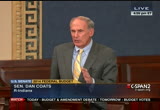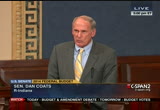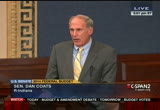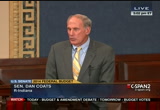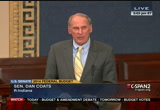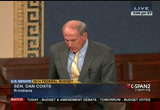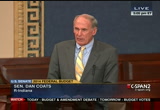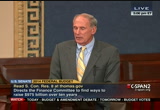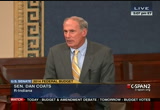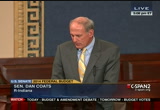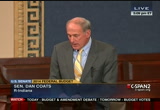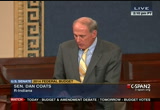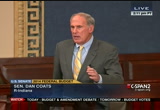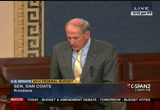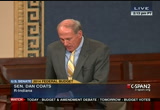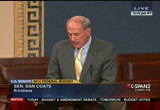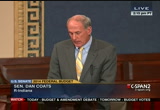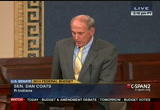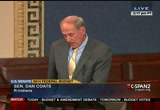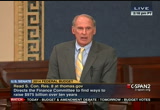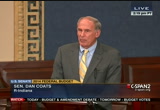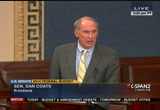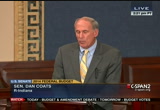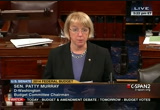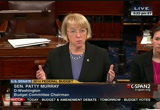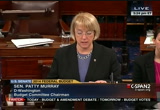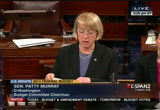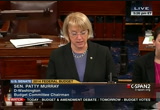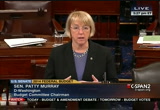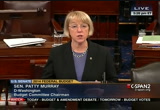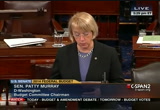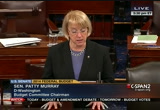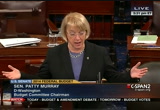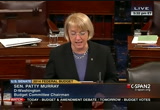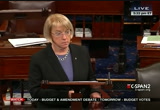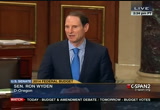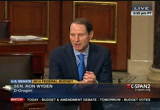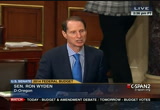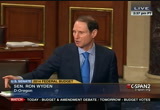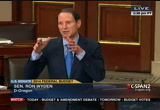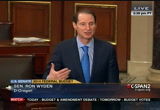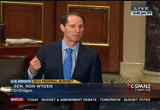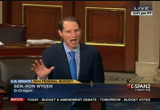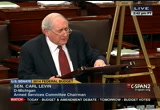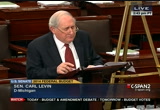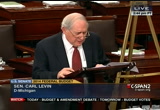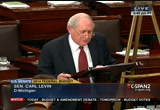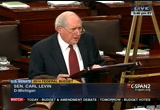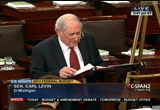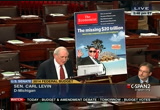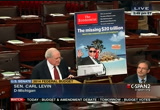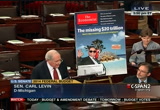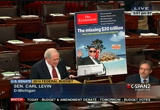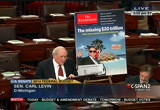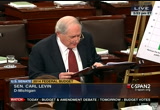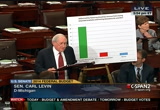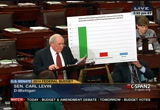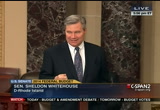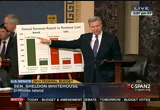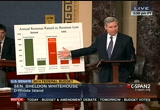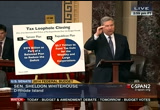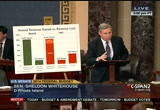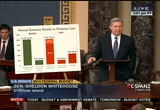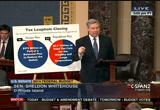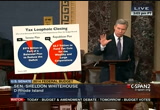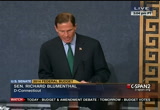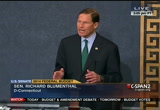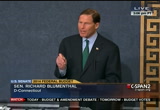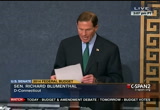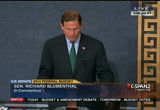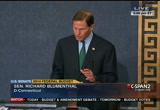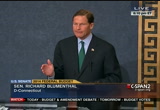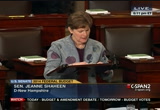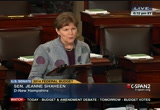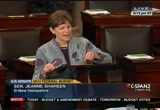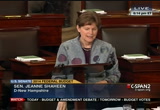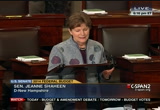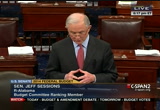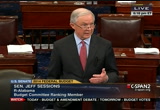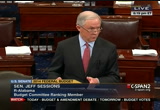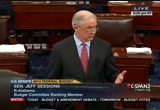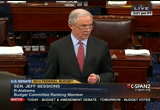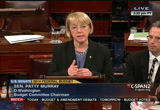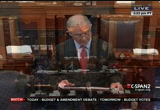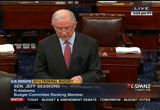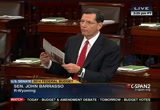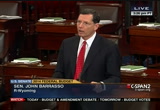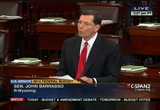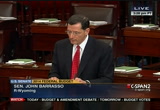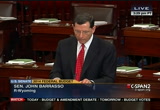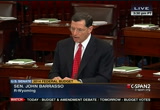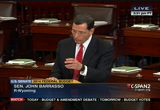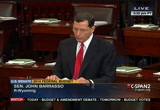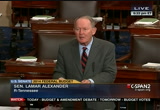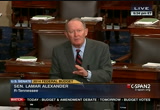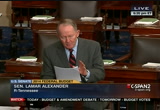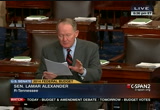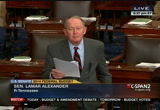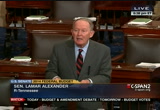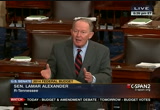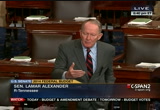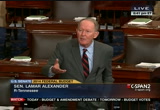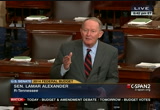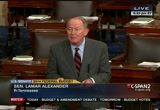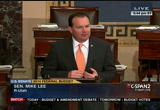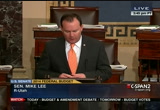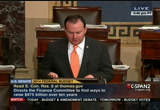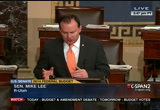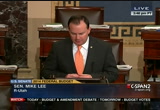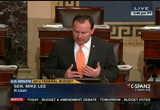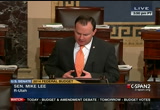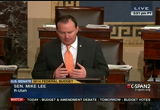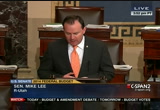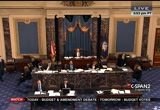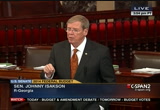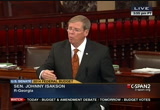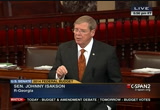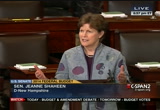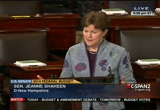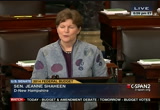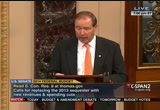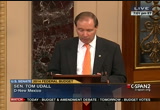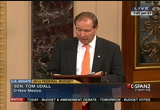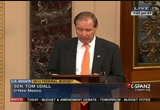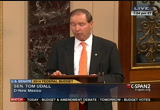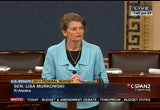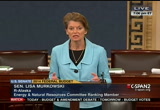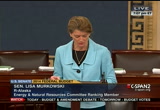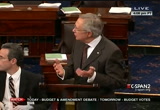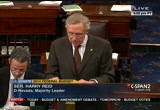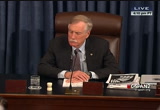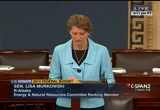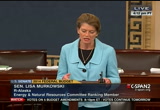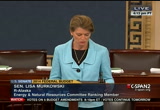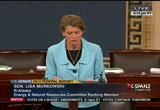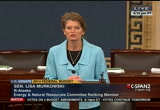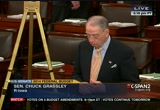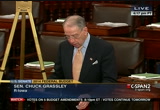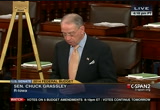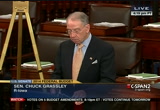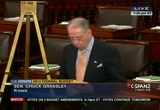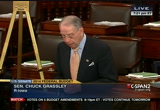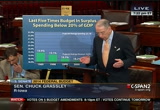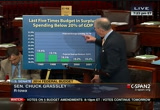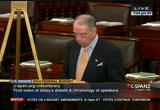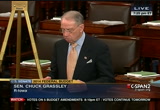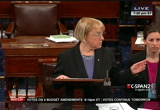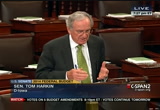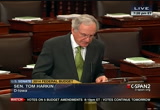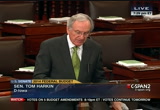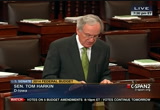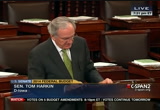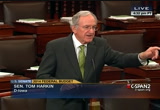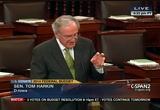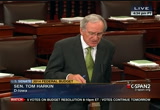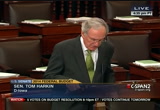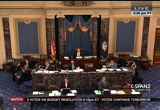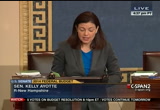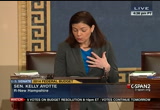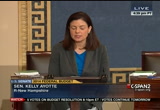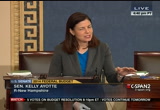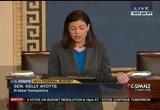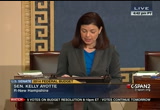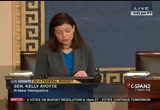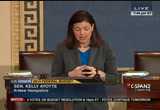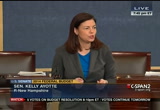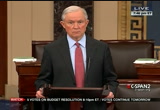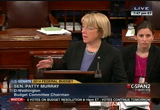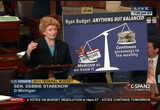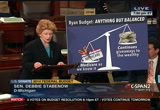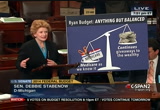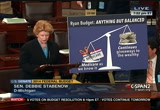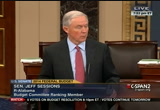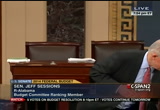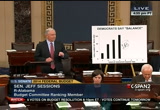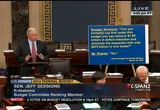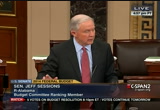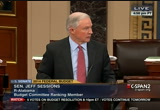tv U.S. Senate CSPAN March 21, 2013 5:00pm-8:00pm EDT
5:00 pm
that we can only keep interest rates low for so long, it's important to understand that a 1% point increase in interest rates would add over a trillion dollars to the united states debt in just a ten-year period of time. and so these historically low rates are not going to stay historically low. they're going to rise as investors lose confidence in america's ability to pay off their debts in the future if we keep plunging into the level of debt and deficit spending that has been taking place here over the past several years. eventually we're going to reach that tipping point. when we reach that tip point, investors and consumer lose conference. and when that happens, interest rates right. and when interest rates rise, it impacts our economy in a very significantly negative way. all we have to do is look across the atlantic at europe and what's happening there to get a
5:01 pm
glimpse of the crisis that can come from not dealing with ever-increasing debt and not taking steps necessary over a period of time to put your country on a fiscal path to health. now, i think most of us know here that we have to make some tough choices and it's going to require political will in order for us to address this. we've been avoiding this for years. expoo we're going to face a debt-induced catastrophe if we don't address it and drean addrt soon. so when you're faced with this kind of fiscal mess, what do you do? well, what families and pise businesses all across america have had to do when they face these types of situations is sit down, create a budget, put themselves back on a path to balance and to prosperity on and to avoid the inevitable, a
5:02 pm
collapse of the family budget or the business budget. our communities and states have had to do this, and we see this happening everywhere except in washington. it is this body and this administration that has refused to step forward, number one, to pass a budget on which to guide our spending and to make the decisions necessary to turn this around and put us on a better path and eventually a path to balance. why a budget? it helps us identify priorities. sitting on the appropriations committee when agency heads and secretaries come before us and present their requests for the future fiscal year in which we are making decisions, i ask each one of them, do you have a plan b? they say what do you mean by plan b? i say that plan, if we continue down this path that's going to ever shrink discretionary spending. and whether it's for cancer or paving roads or education or any
5:03 pm
other worthy project, there's going to be less money if we don't address the spending problem. particularly if we don't address mandatory spending. and i ask them: have you looked to do what every family has had to do, what every business has had to do during this four years of tepid growth and coming out of this recession, which just seems to linger and linger and linger. 23 million people out of work. have you looked at ways in which you can make your spending and your administration of the budget which you oversee, can you make that more efficient and more effective? are there things you can cut? are there programs you can eliminate that no longer are effective or perhaps shouldn't have been there in the first place? are there things that you would like to do but without the resources, you're not able to do at this time, so you have to set them aside? so if the family is faced with lower revenue or dad is, his
5:04 pm
job, his salary has been cut or mom has lost her second job or for whatever reason they're having a hard time making payments -- education for their children and mortgage payments and so forth -- the family has to say we're going to have to look at how we spend money and we're going to have to cut back. so maybe we won't be able to go to disney world this year as we had planned. maybe we need to buy a tent and go to the state park. or maybe we need to do something less expensive. and kids, with the credit card, we're going to have to put limits on that, or you're going to have to scale back. these are decisions that every family has had to make. these are decisions that every business owner has to face with and deal with, and they're doing with. but this is a decision that hasn't been made here. well, four years 1,400-some days, 1,420, i think and
5:05 pm
counting, when the united states senate has not even passed a budget, a budget which will allow us to determine what our priorities are, at least give us a guidepost as to how we're going to spend money and at least present to the american people who elected us to come here and represent them, at least tell them, give them the transparency of how we are spending their money. finally after 1,420 days, after four years we have a budget before us. and while i'm pleased we have a case and i'm pleased we're here debate debating it, it's disappointing when we learn what that budget offers. you would think after four years and the four years that we have been through and the 23 million people unemployed or underemployed and the rate of growth of this economy, half of what it normally is, you would think that that budget being presented to us here would take some steps toward addressing our
5:06 pm
spending issues and would not incorporate $1 trillion or more of increased taxes which will just simply go to more spending. how could we possibly support a budget with a $16.7 trillion debt that plunges us further into debt, with a staggering increase in debt, and also spending that doesn't reduce spending but simply reduces the rate of growth of spending, which is a step but nothing nearly appropriate to what we are facing. so this budget grows government. let's not make any excuses. it grows government by increasing spending. and it grows government by a massive increase in taxes. just after we've had one a few months ago. and not counting the massive increase in taxes that's going to occur beginning in 2014 with
5:07 pm
the implementation of obamacare. when we add that up, when we look at the cost of that, we face dire circumstances. and you would think that the budget being offered to us would not increase debt by 42%, but would address the real problem. now, i know there's been a dispute about how much this budget revenue, taxes are increased. some say $1.5 trillion. those that have presented the budget simply say, oh, no, it's only $1 trillion. whether it's $1.5 trillion or only $1 trillion -- only a trillion, as if only $1 trillion in new taxes on the american people after they just got hit with more than .5 trillion a few months ago and probably hit with another $1 trillion in less than eight months as obamacare kicks in, it just defies credibility. and i think the investment community and consumers and
5:08 pm
taxpayers all across america are going to look at this and say what in the world are you doing? what are the consequences of this? well, the heritage foundation indicates that the senate democrats' budget would cost over eight million jobs nationwide and 225,000 jobs in my own state over the next ten years. they estimate that the budget would reduce economic output by $1.4 trillion and reduce private domestic investment by $820 billion. we don't know exactly if these figures are exact, but we certainly see the trend here. and the trend is a negative consequence, not a positive consequence. so it just -- i think these statistics emphasize the fact that the entire mind set behind this budget seems to be how can we find more revenue to fund more government spending rather than how do we grow the economy? our goal here ought to be grow
5:09 pm
the economy, not grow an already bloated government with more taxes to pay for more government spending. and this budget never balances the budget. we will never reach the point where our states have had to reach in balancing their budget. the majority of our states have had to pull themselves out of a hole, and they have done so because they are constitutionally mandated by their own state constitution to balance that budget. families have to balance their budget, and businesses have to balance their budget. only the federal government under this plan never balances the budget. i've been coming to the senate floor here day after day after day this year basically talking about the need for republicans and democrats and the president to come together with a bold, credible and enforceable long-term plan to reduce our debt and put our country back on a path toward growth and
5:10 pm
prosperity. we need to recognize that it will take more than a quick fix. it's going to take more than this soap opera drama of kicking the can down the road, extending the decisions that we have to make for yet another few months behind this, behind that or whatever. it's going to take us -- it's going to take the will to roll up our sleeves, stop wasting our time? and instead get to work on a plan that will deliver real results for the american people. to solve this dire situation and reduce dangerously high debt, i believe we need a plan that includes three major things: reforming the way we spend. we need to go through each program in every agency and department and determine how we can do more with less. my colleague from oklahoma, tom coburn, already has taken steps to triage our federal government spending by identifying programs that are effective, unnecessary,
5:11 pm
and overly duplicative. we need comprehensive tax reform. the joint economic committee has heard witnesses from the left, from the right, from the middle, nonpartisan, republican, democrat, independents. there is a consensus if we don't have comprehensive tax reform together with a sensible, credible, long-term enforceable spending plan, we will not pull ourselves out of this mess that we're in. the growth element of what we need comes through tax reform. senator wyden and i, in a bipartisan way, have worked years, and he worked years before that with former senator judd gregg in putting together a plan. we're not saying it's the be all and end all, but it forms the basis for a simplification of a tax code. it is revenue-neutral t. addresses our lack of competitiveness around the world in terms of our corporate entities and businesses. it fixes rates at reasonable
5:12 pm
levels. and it ought to be the basis for at least the discussion in moving forward. but if we don't combine our spending discipline with a comprehensive tax reform, we're not going to have the element that can produce the growth, that will produce growth which will produce the revenue which will bring us more, closer to balance. finally, i talk about this all the time. let's have the courage to address what we know is driving us into more and more deficit and prevent -- will prevent us, if we don't adjust it, will prevent us from ever having a rational plan to get us out of this situation. and that's the mandatory spending. let me quote from the president's own bipartisan commission. they said -- and i quote -- "by 2025, revenue will be able to finance only interest payments,
5:13 pm
medicare and medicaid and social security. every other federal government activity -- cancer research, education, paving roads, air traffic control, meat inspectors, everything the government does that is of essential function for the federal government, not to mention national defense and homeland security, every other function of the federal government will have to be paid for with borrowed money because our revenues will only pay for these few programs, which is eating up all of our expenditures. i go back to their statement. "debt held by the public will outstrip the entire american economy. going through as much as 185% of g.d.p. by 2035. interest on the debt could rise to nearly $1 trillion by 2020."
5:14 pm
that's just six years away. "these mandatory payments," they said, "which buy absolutely no goods or services, will squeeze out funding for all other priorities." so not only will the uncontrollable growth of mandatory spending squeeze out funding for all other programs or priorities in our country, but it will also jeopardize the safety net that we have put in place for retirees who have worked hard and put money aside to become eligible when they retire for social security and medicare, and for those who find themselves in a situation where medicaid is a necessary safety net. we've always taken pride in being a country that is compassionate. we've been a place where if you work hard and earn a good living, you can earn a good living. you can raise a family. and then in later phases of life, you'll be able to rely on the safety net of health and
5:15 pm
retirement programs that you've invested in. but if we don't act on mandatory spending, if we don't act on medicare, medicaid and social security, we will all but ensure the demise of these much-needed programs for future generations. failing to act and leaving our children and grandchildren with this enormous debt burden is immoral. we all know and we ought to -- or we ought to know by now that our current path is unsustainable. academics, economists and business leaders from all sides of the political spectrum repeat the same thing -- unless we make the tough choices that we have been avoiding for years, we're going to face a debt-induced catastrophe, and it's only a matter of time when the clock is -- and the clock is running down. congress and the president must summon the courage and the political will to do the right thing and take the tough medicine now that will heal this economy. what we have been doing for the
5:16 pm
last two years that i have been here is basically looking at a chronic illness and saying take two advil, maybe you will feel better in the morning. that doesn't work. we need the bold, the credible, the enforcable plan that will put us on the path to prosperity, and it must include, must include spending discipline, comprehensive tax reform and mandatory spending reform. mr. president, i'm going to be offering up to five amendments to this budget. i don't want to spend a great deal of time on this now. let me just for the record mention the five that i am going to offer. the first is the mandatory spending budget point of order. this will be a point of order against any legislation that increases the net level of mandatory spending at any time our country -- our gross federal debt exceeds 100% of the economy
5:17 pm
or our g.d.p. numerous studies have said that when you reach 90%, when you reach 90%, you are at a tipping point and it becomes historic historically proven that it has a negative impact, serious negative impact on your economy. i have raised this to 100% to allow a little room and this poured will be in place and can only be -- if passed can only be overridden with 67 votes. this i think will force congress to think before we act. secondly, i'm offering an amendment that's called transparency legislation, debt transparency. one of my colleagues and members of the house of representatives has -- luke messer, has passed this in the house with bipartisan support, very significant bipartisan support. it simply requires the congressional budget office to
5:18 pm
report annually an estimate of the cost per taxpayer of the deficit for any year that the president's budget is projected to be a deficit. the american people deserve to know this number, and this amendment would achieve that. i'm also offering an amendment to repeal the 3.8% tax on investment income. if you want to stifle the economy more, if you want to prevent more growth and slow down this economy, throw another tax in on the very people who are providing the capital and the investment, yet another tax. and we just talked about the medicare -- excuse me, the medical device tax, which i have supported and working along with democrat cosponsor, senator klobuchar from minnesota and many others have joined this. absolutely irresponsible tax, simply a pay-for for the health
5:19 pm
care plan that taxes the very industry that is providing us revenues, high-paying jobs and helping our trade balance by the quality of products that are exported overseas. this is crippling and it's forcing some of these companies to look overseas because of this egregious surtax on top of all the other tax that they pay. and so i support senator hatch and senator klobuchar's amendment to repeal that medical device tax. i'm also offering an amendment designed to fix our broken and convoluted tax code. i see senator wyden has come to the floor. senator wyden and senator gregg started a heroic project several years ago to put together a comprehensive tax reform package. it's -- the work and the hours spent in pulling this together is amazing. when senator gregg left the senate, he called me and he said this is something i think you
5:20 pm
ought to take a look at, and perhaps you could take my place and work with senator wyden so it could be a bipartisan effort going forward. we have discussed this with our colleagues. it should serve as the basis for tax reform. as i said earlier in my remarks, we cannot address this problem without spending discipline and comprehensive tax reform combined, and all the witnesses that have come before us in the joint economic committee have asserted this and enforced this. that is the necessary element to provide the growth to accompany the spending discipline and then added to that the mandatory entitlement reform. and then finally an e.p.a. amendment which i am working with my colleague, senator manchin, the democrat, again a bipartisan effort to deal with a particular environmental e.p.a. agency rule. i won't go into the details of that. these will be some of the amendments that i will be
5:21 pm
offering in conjunction with my colleagues to hopefully make this budget a better piece of legislation. just to conclude, mr. president, it's been four years since the senate has passed a budget. the plan before us, in my opinion, has not been worth the wait. it won't help generate more jobs for the more than 23 million americans either unemployed or underemployed. it won't improve this slow economy. it won't save medicare and social security from going broke. it won't produce a path to bipartisan comprehensive tax reform. it won't ever balance the budget. and it won't help hard-working americans get back to work and get ahead in this life. we can do better than this. after four years of inaction, the american people deserve better than this plan. the american people elected a divided government. it was not a mandate for either party.
5:22 pm
it's a challenge and a challenge that all of us need to accept. so let us act now. let us summon the courage to stand up and work together on a truly balanced plan, not one that calls forever more spending and ever higher taxes but one that puts in place real reforms. the first step is passing a credible budget. sadly, in my opinion, this budget doesn't match the need. and so hopefully we can make the adjustments to this to put us on that path to prosperity, and with that, mr. president, i yield the floor. mrs. murray: mr. president? the presiding officer: the senator from washington. mrs. murray: thank you, mr. president. i yield myself ten minutes off the resolution. the presiding officer: without objection. mrs. murray: mr. president, we are having this debate today in hopes of ultimately reaching a fair and bipartisan budget deal, and we all know that's not going to be easy, so the least we can do is get our facts straight. it's kind of disappointing to see that rather than engaging in a productive conversation, some of our republican colleagues
5:23 pm
prefer to launch some pretty inaccurate attacks, so i'd like to take just a moment here to correct those inaccuracies so that we can really focus on the urgent task at hand. now, some republicans continue to claim that the senate budget includes a $1.5 trillion tax hike. now, i talked about this last night but i want to make it clear again, this is not true. here are the facts. of the $975 billion in new revenue from those who can afford it the most, $480 billion is matched with responsible spending cuts to fully replace sequestration, $100 billion goes towards targeted high-priority infrastructure repairs and job training to help boost our economy and put americans back to work. the rest goes to reduce the deficit. but unfortunately, rather than seriously considering the credible path that we have presented in our budget plan, some republicans have decided to play some games with these
5:24 pm
numbers and are not telling the truth. instead of subtracting the sequestration replacement portion and the investment package from that $975 billion in total revenue, they are trying to say that you should add it all together. they are taking one side of the ledger, combining that with the other side of the ledger and coming to a conclusion that makes absolutely no sense. it doesn't make sense, and you don't have to take my word for it. fact checkers, reporters have called this claim false. they have called it a step too far. and "the washington post" fact checker even gave it two pinocchios. now, republicans have also made the flawed argument that this budget actually only includes $300 billion in deficit reduction. that distorts the facts. it is not true and it is inconsistent, actually, with what republicans have claimed in the past. mr. president, our budget
5:25 pm
includes 1.85 in deficit reduction, evenly divided between responsible spending cuts and new revenue. that revenue comes from closing our loopholes and cutting wasteful spending from the tax code that has been skewed towards the wealthiest americans and biggest corporations. but some republicans say that because part of what we are doing is replacing sequestration with smarter deficit reduction, that this somehow diminishes the savings. you know, i actually find this kind of interesting because i served on the joint select committee on deficit reduction when republicans and democrats discussed ways to replace sequestration, which is, of course, well after sequestration had been signed into law. now, we didn't reach an agreement because republicans refused to include revenue, but we did agree then that deficit reduction to replace sequestration was deficit reduction. in fact, my colleague, senator toomey, put forward a plan to
5:26 pm
replace sequestration, to replace sequestration that he said would have -- quote -- "reduced our deficit by $1.2 trillion. mr. president, i find it odd that some republicans were willing to count replacing sequestration as deficit reduction when they were putting forth plans to do it, but they won't treat the senate budget the same way, especially since bipartisan groups including simpson-bowles and domenici-rivlin and the committee for responsible federal budgeting all used the same starting point that the senate budget does. like us, these groups know sequestration was not deficit reduction. it was there to trigger deficit reduction that would come from replacing it. that was the whole point. in fact, the center on budget and policy priorities noted that the senate budget uses the appropriate starting point, and i quote -- "bowles and simpson received no criticism when they did the same thing for their new
5:27 pm
budget plan a few weeks ago." and, mr. president, i didn't hear any republicans complaining then. so this just goes to show that sadly some of our republican colleagues appear more interested in politicized attacks than serious consideration of our plan. mr. president, the american people deserve better. they deserve better. they want an honest conversation. that is what they are trying to have with the credible approach that we have put forward. and finally, mr. president, i want to strongly dispute the criticisms that i have heard that democrats somehow don't take reducing our deficit and debt seriously. mr. president, despite what you may have heard, democrats care deeply, as you and i both know, about restoring our nation's fiscal health. we think it would be absolutely wrong to pile up unsustainable debt and hand it to our children. that is exactly why the senate budget presents a serious, credible and sustainable
5:28 pm
approach to getting our debt and deficits under control. mr. president, experts across the aisle have generally come together around a few principles for responsible deficit reduction plans. the senate budget builds on the work of the last two years to meet each of those benchmarks. in 2010, the simpson-bowles fiscal commission recommended finding roughly $4 trillion in deficit reduction over ten years. this has now become the benchmark of other serious bipartisan proposals. the senate budget builds on the $2.4 trillion in deficit reduction that's already been done in the last two years since simpson-bowles, with an additional $1.85 trillion in new deficit reduction, for a total of $4.25 trillion in deficit reduction since the simpson-bowles report. so the senate budget, what it does is it takes us the rest of the way to that $4 trillion goal
5:29 pm
and actually beyond it. and following the recommendations of simpson-bowles and the senate gang of six plans, the senate budget importantly reduces the deficit to below 3% of g.d.p. by 2015 and keeps it well below that level for the rest of our ten-year window in a responsible way. and it pushes our debt as a percentage of the economy down and moving in the right direction as we have been told is an important goal. so, mr. president, our budget reaches these benchmarks the way the american people have consistently said they want it done and the way economists and experts across our political spectrum have recommended, with an equal mix of responsible spending cuts across the federal budget and new revenue raised by closing loopholes and cutting wasteful breaks that, by the way, primarily benefit the rich. this budget cuts spending responsibly by $975 billion, and as the presiding officer knows,
5:30 pm
we made some pretty tough choices to get there, as a member of the budget committee. we think every program, including the ones we know are important, need to be trimming out the waste and reducing costs so our taxpayers get that benefit. so $500 billion of our cuts come from responsible savings on the domestic spending side, including $275 billion in health care savings that we do in a way that doesn't harm seniors or families. mr. president, there are no sacred cows. we have put everything on the table. but we do it in a responsible way to preserve and protect and strengthen programs like medicare and medicaid that the american people support as well. our budget saves $240 billion by carefully and responsibly reducing defense spending while giving the pentagon enough time to plan and align the reductions to time with the drawdown of our troops from overseas.
5:31 pm
the remainder of the savings, $240 billion, comes from savings on interest payments due to lower debt. taking the balanced approach the american people have consistently called for, our senate budget matches those responsible spending cuts with $975 billion in new revenue, which is, again, raised by closing loopholes and cutting unfair spending in the tax code. while locking in tax cuts for the middle-class and low-income working families so we protect them from paying any more. there is bipartisan support for reducing the deficit by making the tax code more fair and efficient, mr. president. you know, during the fiscal cliff negotiations speaker boehner proposed that we reduce the deficit by $800 billion by closing what he called special interest loopholes and deductions. so the senate budget just takes him up on that. every bipartisan group that has tackled this issue in a serious way recommended a lot more
5:32 pm
revenue than the $600 billion raised from the wealthiest americans in the year-end deal. so, mr. president, if our budget passes, the total deficit reduction since the simpson-bowles report will consist of 64% spending cuts, 14% tax rate increases on the rich, and 22% new revenue from closing loopholes and cutting wasteful spending in the tax code. mr. president, that's a responsible approach. it is a balanced and fair approach. it is the one endorsed by bipartisan groups and experts, and it is one that is supported by the vast majority of the american people. so i want to say this again. here are the facts. our budget does not include $1.5 trillion tax hike. it does raise $975 billion, again, from closing loopholes and cutting wasteful spending in our tax code. it reduces the deficit by $1.85 trillion, when analyzed
5:33 pm
the same way republicans have analyzed their own proposals. and, mr. president, democrats do care deeply about our country. we do want to reduce our debt and deficits. which is exactly why we have put forward a responsible proposal to put our debt and deficit on a downward, sustainable path. as we continue this debate over the next day i urge my republican colleagues to stick to the facts. let's end the misinformation and let's work together on the job the american people want to us focus on and get a comprehensive budget deal and get our country back on track. thank you, mr. president. and i would yield ten minutes off the resolution to senator wyden. mr. sessions: would the senator yield for a question? i won't insist on an answer, but i would just like to raise a friendly -- mrs. murray: we have two senators waiting to talk. i would be happy to answer that
5:34 pm
but if i could let them go on our time. mr. sessions: you have your time. that will be fine. thank you. mrs. murray: i yield ten minutes to senator wyden and 35 minutes to senator kevin. mr. levin: that 35 minutes would be allocated by me among a number of senators on this side. the presiding officer: without objection. the senator from oregon. mr. wyden: mr. president, when we began the budget debate in senator murray's committee last week, i said that senator murray's challenge gave new meaning to the idea of playing a tough hand, and many thought that her task was essentially mission impossible. the fact is, mr. president, for all of us who know senator murray well, she has spent her whole life coming up with solutions to those matters that people said were mission
5:35 pm
impossible. she spent her whole life coming up with accomplishments that actually solve problems, and i just want to commend senator murray for all of her work on this matter, and i think it's very clear that when we get the kind of bicameral, bipartisan agreement that addresses the major concerns we're debating here on the floor, it is going to be to no small measure because senator murray continued to reach out to all sides, and i just want her to know how much i appreciate that. mr. president, and colleagues, i think we all understand that these are complicated issues, and at the same time the challenge of coming up with a bipartisan agreement here is not rocket science in terms of identifying what the issues are. there are two issues here,
5:36 pm
mr. president. one of them is taxes, and the other is medicare. and the two of them, in fact, are inextricably linked in many respects because i've heard some on the other side of the aisle say i'll look at ways to reform taxes if colleagues on the democratic side will look at ways to protect medicare and at the same time hold down its cost. and we've heard other senators say the reverse. and so these issues are really inextricably linked. and one of the reasons that i support this budget this evening, mr. president, is that i think this budget provides significant space, significant space for democrats and republicans as this process goes forward to produce bipartisan solutions on those two issues,
5:37 pm
the tax question and the medicare issue in the days ahead. and let me take just a few minutes. senator coats talked about our bipartisan efforts. i've had a chance really for the last five years to work with two very thoughtful conservative republicans, senator coats and our former colleague, senator gregg, and senator begich and i have been part of a bipartisan team that is in effect seeking to modernize some of the principles that a very big group of democrats and ronald reagan agreed to in the 1980's which is to clean out some of these outlandish special interest tax breaks tax breaks. and i see my good friend, senator levin, here tonight and he is going to outline just some of those outlandish tax breaks. we ought to clean them out and use a portion of those dollars to hold down the rates and keep
5:38 pm
progressivity. and in the two years after democrats and republicans did that, in the 1980's the country created millions of new jobs. no one can say every one of them was due to that tax reform effort, but it certainly helped. and we had senator enzi on the floor earlier this evening, and i've been working with her on something that i think really has been missed in the tax reform debate and that is senator enzi has said when are people going to start talking about the transition rules that you would need to actually implement the tax reform plan, because today in a global economy, and senator murray and i come from a part of the world that's so trade sensitive, here we've got senator enzi talking about something very practical that ought to be very attractive to the most progressive member of the senate and the most conservative member of the senate, and under the murray proposal, those are the kinds
5:39 pm
of ideas we could be looking at in the days ahead. so let me now turn, if i might, to the medicare issue, mr. president, which, again, we all understand is right at the heart of when senator murray and congressman ryan and all those are going to be in a bipartisan conference negotiating, i continue to believe it is critically important to protect the medicare guarantee, something i have battled for since the days when i was codirector of the oregon gray panthers, and we can do it in a way that will hold down costs. this is another area where senator murray has given us a chance to look at some of the solutions that could win support on both sides of the aisle and i'll just touch on them briefly. for years now we have had advocates on all sides of the political spectrum talk about the value of merging part a, which is the hospital portion of
5:40 pm
medicare, with part b, the doctors and outpatient part of the program. here's a chance, colleagues, to say -- to save billions of dollars while also helping vulnerable seniors hold down some of their out-of-pocket expenses. it is there for the doing under the murray budget i think we can forge bipartisan support for it. let me move on now to the question of chronic care. this is where, mr. president, more than 70% of medicare costs go. for those who are suffering from heart and stroke and cancer and diabetes. now, the accountable care organizations, which are an important part of the affordable care act, are clearly going to help with respect to how we look to treat this population. but it is not going to lift all the boats, mr. president. and there are a lot. very effective plans and group
5:41 pm
practices around the country that are going to give us the opportunity to put in place integrated, effective plans to help the sickest among us. we ought to pursue it. the murray budget is going to give us that opportunity. and i'll close simply by saying there's some very good ideas for promoting medicare quality and holding costs down which cost very little, such as the approach that senator grassley has given me the chance to partner with him on that would open up for the first time the medicare deadbeat so -- data base so we would get a sense what medicare was paying various doctors and providers for various services. i know colleagues are waiting to speak and i will just wrap up by saying that on the biggest challenges of our time, which i think really come down to two issues -- taxes and medicare -- the murray budget gives us a chance to come together in a bipartisan way --
5:42 pm
we're not going to get it all done, obviously, this week but we're going to have a chance to do it and i think in both of these areas, taxes and medicare, there are senators on both sides of the aisle who find what a way to help senator murray and others who will participate in these discussions, get us to the solutions that we need that will strengthen our economy and protect our people. mr. president, i yield the floor. the presiding officer: the senator from michigan. mr. levin: mr. president, first i want to commend senator murray and the budget committee for the plan that they've presented to us. it really represents an enormous step forward on an issue of huge significance to american taxpayers. it's a step towards balanced deficit reduction. an important part of balanced deficit reduction is reducing the deficit without severely damaging important protections for and investments in american
5:43 pm
families and one way to do that is ending unjustified tax loopholes and ending the damage they have inflicted on our budget. senator murray's summary of the foundation for growth, the budget plan before us, refers to "the sheer magnitude of the revenues lost to offshore tax abuse, wasteful and inefficient loopholes, and other business tax breaks." now, many senators have focused on this issue over the months and the years, a number of them will i expect be joining me on the floor over the next few minutes. for many years as chairman of the permanent 13450e subcommittee on investigations -- permanent subcommittee on investigations, i have focused on the maze of offshore schemes and gimmicks that are concocted to allow a privileged few to avoid paying the taxes that are rightfully owing. our subcommittee has on a bipartisan basis filled volume after volume with damning detail
5:44 pm
on how these schemes work and the damage that they cause. and now as senator murray and the budget committee have pointed out in their blueprint, we are at a moment in history when we can remove this blight. the pressures on the federal budget and the threat to economic growth and prosperity that they represent require action. we must close these loopholes. the relentless arithmetic of our budget situation compels it. fairness and justice demand it. so we come to the floor today in support of the revenue provisions in the budget resolution before us. now, we're going to outline the case for ending these tax avoidance schemes, the preposterous contortions that too many corporations and wealthy individuals employ to avoid paying taxes. we'll illustrate the huge loss in federal revenues, the resulting rise in deficits from these contortions, and we'll
5:45 pm
show how that loss has contributed to a shift in the tax burden from corporations and wealthy to middle-class families and small businesses. this is a shift that has occurred largely without the notice or the approval of the american public. and we're going to demonstrate how closing these loopholes is integral to any balanced deficit reduction agreement that is built on the common good. the case for additional revenue and for closing tax loopholes is a source of that revenue is overwhelming. serious deficit reduction requires more revenue, as everybody from the simpson-bowles commission to the domenici-rivlin task force to the concord coalition to fix the debt have recognized. they have rightly concluded that without additional revenue, the deficit reduction numbers simply do not add up. republicans have insisted that the discussion of revenue as
5:46 pm
part of our deficit reduction approach is finished. speaker boehner the other day claimed -- quote -- "the talk about raising revenue is over." he's mistaken. our effort is picking up steam and these republican protests cannot erase the fact that federal revenue remains significantly below its historic average as a percentage of the gross domestic product, our economy, and that revenue is and under current trends will continue to be below the levels that we have needed in the recent past to balance the budget. in particular, the loss of corporate tax revenues is an ongoing cause of deft sits. at a time when corporations enjoy record profits, the highest in half a century, revenue from corporate income taxes has fallen off as a percentage of our taxes collected n.
5:47 pm
in 2006, corporate tax revenue made up about 15% of all federal revenue. in 2012 it had fallen to 10%. now, somebody has to pick up the slack, and in this case it's been average american families. why is corporate revenue a shrinking share of our treasury even though the u.s. corporate tax rate, 35%, is one of the highest in the developed world? and that's because the top tax rate doesn't tell the story. while our tax rate at the upper limit is 35% on corporations, the average u.s. corporate taxpayer's actual tax rate was just 12% in 2011, which is the lowest in generations. a recent study by two think tanks found that 30 of our largest corporations with combined profits of more than
5:48 pm
$160 billion, paid no income tax, zero, from 2008-2010. that's with profits of $16 $160 billion. now, the permanent subcommittee on investigations, which i chair, has outlined in great detail the black magic that these corporations employ to make their tax bills disappear. one major culprit is offshore tax avoidance. this is hardly a new problem but it is receiving attention like never before. perhaps because it is simply too big to ignore any longer. this recent edition of "the economist," just a few weeks ago pointed out in its lead story and on its cover that tax haven abuse is now a $20 trillion problem for the global economy.
5:49 pm
now, that's $20 trillion, mr. president, not billion. they also have a special report on the offshore finance and the headline here -- and it's an eye-popper i hope -- is that "the missing $20 trillion: how to stop companies and people dodging taxes." the subcommittee on investigations -- subcommittee on -- per permanent subcommittee on investigations has been digging into these abuses for years. just last year, a subcommittee report outlined how just three u.s. companies -- apple, google and microsoft -- had used offshore gimmicks to avoid taxes on almost $80 billion in profi profits. much of this tax avoidance stems from manipulation of intellectual property and other intangibles.
5:50 pm
companies develop valuable knowledge within the united states, often using tax credits, grants and other federal suppo support. they then transfer that valuable property under various legal schemes to offshore subsidiaries at bargain basement prices, thereby shifting the profit that this valuable property generates overseas where it is shielded from taxes. other offshore schemes involve pretzel-like twisting of tax laws. for example, the subcommittee found that hewlett-packard employed such a gimmick to bring home money that was held offshore, to bring it back to the united states without paying the required taxes. now, here's what the law requires. that when profits are brought back to the united states, profits are taxed. the i.r.s. allows an exemption for very short-term loans from offshore subsidiaries to their
5:51 pm
domestic parent. hewlett-packard exploited that exemption by concocting a rotating series of alternating loans from a pair of offshore subsidiaries to make billions of dollars in what should have been taxable repatriated income appear to be short-term loans exempt from taxation. this is a gimmick that is so blatant that even some have hewlett-packard's accountants questioned it. our subcommittee found that hewlett-packard used this offshore cash, used it here, shielded it from taxes to help run its u.s. operations during the 19 -- 2010 fiscal year. and to quote from my owb my subcommittee's description -- quote -- "there does not appear to be a gap of a single day during that period where the loan funds of either of these two offshore subsidiaries in
5:52 pm
question were not present in the united states. and the similar pattern of continuous lending appeared to be occurring for most of the period between 2008-2011." now, it's short-term loans -- i believe 30 days or less -- which are supposed to be exempt from taxes when they're lent from an offshore subsidiary back to the parent here in the united states. this is going on for years without a gap using a gimmick that they used in the tax code which is egregious. it's time act, mr. president. senator whitehouse and i introduced the "cut unjustified tax loopholes act" not too long ago. our bill would help address some of these tax schemes and others as well. it's a puzzle weapon in our deficit-reduction arsenal if we will use it. -- it's a powerful weapon in our deficit-reduction arsenal if we use it. today, a coalition of more than two dozen national coalition groups as well as dozens of
5:53 pm
state and local organizations, drafted a letter urging the senate to adopt our "cut loopholes act" and i would ask unanimous consent, mr. president, that this letter be made a part of the record. the presiding officer: without objection. mr. levin: mr. president, i'm going to close now because a number of our colleagues have joined me near this effor here . and i just will close with the following comment. some of the people argue that they'll consider closing tax loopholes but only if the resulting revenue is used to lower tax rates rather than reducing the deficit. this position is unwise for two reasons. first, the budget deficit is a significant problem for our country and we should address it. senator murray's budget wisely takes the view that we need to act to reduce the deficit. second, the people who elect us overwhelmingly believe that reforms to end these tax schemes which i've outlined should
5:54 pm
contribute to deficit reduction. and a recent poll shows that more than 80% of americans believe that revenue that we recover from closing tax loopholes should be dedicated to reducing the deficit, not to cutting rates. so let's follow the path that this resolution -- budget resolution before us outlines. spending cuts? yes. but prudent, carefully considered cuts that preserve our most important priorities. savings from reform of entitlement programs? yes. but reforms that keep the faith with seniors today and in the future. and, yes, revenue. revenue that ends the privileges of an influential few who have for far too long enjoyed unjustified tax breaks that boost corporate profits and the bank accounts of a few wealthy at the expense of ordinary americans. mr. president, earlier today, senators whitehouse, mccain
5:55 pm
and i, a bipartisan group, filed an amendment to the budget resolution suggesting the need to close tax loopholes. our amendment makes reference to ending tax offshore -- excuse me, to ending offshore tax abuses by large corporations. our amendment provides that at least some of the revenue generated must be used for deficit reduction. this bipartisan amendment makes a strong statement on the momentum that is building up for balanced, commonsense deficit reduction. and so does the group of senators who come to the floor with me to call for ending these tax schemes and gimmicks. i thank senators mccain and whitehouse, and i also thank our other colleagues who are here today for the work that they put in on a very vitally important issue. i believe -- senator whitehouse, are you ready to proceed? i'm not sure who got here first but senator whitehouse is my
5:56 pm
principal cosponsor on this amendment, besides senator mccain. perhaps i would yield. how much time do i have left, mr. president? the presiding officer: the senator has 24 minutes remaining in his time. mr. levin: all right. the senator will yield nine minutes be sufficient, senator whitehouse? mr. whitehouse: nine minutes will probably be more than sufficient. the presiding officer: the senator from rhode island. mr. whitehouse: let me open first by thanking chairman levin for his leadership on this. i'm delighted to be part of his levin-mccain-whitehouse group putting this together. if you boil down the discussions that we're having back and forth about the budget, they boil down to a very simple question and that is: can we use the money that is in tax avoidance, in tax loopholes towards solving our
5:57 pm
sequester problem, our deficit problem, and our debt problem? now, the way this has been described so far is that there is spending cuts -- that's one part of the equation -- and the other part is tax increases. that's been the way this has been framed. that overlooks the third big piece of the problem which is money that goes out the back door of the tax code without ever coming into the united states government in revenues. and i want to let people who are watching know, because they probably won't believe it, what a big number that is, what a colossal number that is. we get a trillion dollars, $1.09 trillion, to be specific, in revenue out of the individual tax code. we get $181 billion in revenue out of the corporate tax code.
5:58 pm
we give away $1.02 trillion out the back door of the tax code for individual deductions and loopholes. we give away $157 billion out the back door of the tax code in corporate deductions and loopholes, and there's another the i.r.s. estimates $385 billion that never even gets into the formula because of what chairman levin was talking about. companies and individuals that hide their revenue offshore, hide their income offshore so it never even gets into the tax package. if you add it up, there's actually more money lost through tax avoidance than there is collected in tax revenue in this country. so when people talk about only the tax revenue and only spending cuts, they are trying to hide a very, very big ball.
5:59 pm
and that is the basic difference between the democratic proposal and the republican proposal. we want to take $975 billion, which is only 7% of all the money that goes out the back door of the tax code, $7% and use it toward ending the sequester, balancing the budget. that's our proposal. the ryan republican proposal is to take 41% of that money that goes out the back door of the tax code and use every nickel of it -- every nickel of it -- to lower the high-end rates for corporations and for wealthy americans who pay the highest end rates. they don't put a dime from this towards either the sequester or deficit reduction.
6:00 pm
we can't have that be the rule. if you take this number, which is an annual number, the minimum is right here, $1.2 trillion plus $157 billion. we do our budget over a ten-year span, and these are annual numbers. so that means in a ten-year budget horizon, you've got at least $11.5 trillion going out the back door of the tax code. if you allow for moderate growth in the economy, it's not $11.5 trillion, it's $14 trillion. and if you throw in the nearly $400 billion in offshoring, you're up to nearly $18 trillion
6:01 pm
trillion -- $18 trillion -- that go out the back door of the tax code. and, by the way, although there are important middle-class deductions in the middle of this, like the home mortgage deduction, there's an awful lot of nonsense and mischief in the tax expenditures that go out the back door of the tax code. if you want to know why hedge fund billionaires pay a lower tax rate than their chauffeurs, than the hospital orderly rolling his cart down hospital hallways in the middle of the night, you look in the mischief of the tax code for the carried interest exception. if you want to know why corporate jets, private jets get favor treatment, look at the accelerated depreciation schedules in the corporate tax code. there is a lot of mischief and monkeyshines that have been built into the tax code by lobbyists for the wealthy and
6:02 pm
lobbyists for powerful corporations over the years. and all we want to do -- and what this fight's all about is taking $975 billion out of that trillions and trillions and trillions of dollars that go out the back of the tax code and use that to get rid of the sequester and to balance the budget. that's what we want to do. and what the republicans want to do is to take 41% of that and use every dollar -- every dollar -- to lower tax rates for the richest people. they don't spend a nickel in all of that towards reducing the deficit or towards ending the sequester. this tax code spending, all the earmarks that the lobbyists built into the tax code over decades, that's the republican treasure trove. that's their alley pwab about a's -- ali baba's cave.
6:03 pm
and they don't want to spend a nickel of it getting rid of the sequester. they want all the treasure in ali baba's cave of special tax deals to stay with the big corporations and with the wealthy in the form of lower tax rates. that is the entire debate between our sides right now. and i think chairman levin by putting forward this plan to take this offshore hidden revenue and bring it into the discussion and use it to help solve our sequester, use it to help support our economy, use it to help reduce or deficit, is a very, very strong idea. so i'm very pleased to support him. i appreciate his leadership. i'm delighted that john mccain has joined us on this to make this a bipartisan initiative. they show great leadership together. and i'm delighted to join them. and with that, mr. president, and with my great appreciation to chairman levin, i will yield the floor. mr. levin: mr. president? the presiding officer: the senator from michigan. mr. levin: first let me thank
6:04 pm
senator whitehouse. he has been a leader in this effort for a long, long time, and his support here is critical and really will make a difference. how much time do i have remaining? the presiding officer: 14 minutes remaining. mr. levin: i would yield 7 minutes to the senator from connecticut. the presiding officer: the senator from connecticut is recognized. mr. blumenthal: thank you, mr. president. i want to add my thanks to the chairman of the armed services committee and the leader in this effort to close some of these abusive and unnecessary and wasteful loopholes, and thank also senator whitehouse and senator mccain for their leadership in this effort, which is about fundamental fairness. but most important, let me thank senator murray for the hard work, the courage and strength that it has taken to put
6:05 pm
together a budget that is intensely complex, dealing with issues that are hugely challenging and craft a solution that presents a vision for the future of america that i think is very distinct and different and also very preferable to the one presented by the house budget. the house insists on a cuts-only approach. and absolutely refuses to consider new revenue. the solution crafted by senator murray and her committee has opted for balance and compromise, two words that unfortunately are too often missing from our deliberative process. our budget achieves $1.85 trillion in new deficit
6:06 pm
reduction, with an even mix of $975 billion in new revenue and $975 billion in responsible spending cuts. that is a real achievement. we're here today to talk about cutting loopholes, tax breaks, give-aways to people who don't need them, corporations that don't deserve them in a way that undermines the fundamental fairness of our tax code. the fact that more money goes to tax avoidance than to tax revenue is a fundamental searing indictment of our tax code, and it's the reason that there is resistance to people paying their fair share. again and again and again what i hear from citizens, from taxpayers, from residents of the state of connecticut is "i would be willing to pay my fair share
6:07 pm
as long as others are required to do the same." fairness is at the core of our tax code. it's the reasons why voluntary compliance is so important and why it happens. because people rely on its fundamental fairness. the offshoring of profits and ending those offshore tax abuses that have been described so eloquently by senators levin, senator whitehouse is absolutely necessary to a sense of fairness in our tax code. as important as the additional money is, a sense of equity that they would bring to our tax code. likewise, fair and effective tax enforcement is critical. i know as an enforcer of civil laws for 20 years as attorney
6:08 pm
general, they are important to a sense of fairness in our society and effective enforcement requires resources. it requires tightening rules relating to tax shelter promoters, stiffening penalties. in the aeurdz -- in the aiders and abettors, the ones who enable violations of our tax laws and tax evasion and modernizing federal tax lien registration. we are fond of saying in this body that the devil is in the details. here the devil is in nonenforcement of those detailed regulations and rules that require compliance. similarly, ending excessive corporate tax deductions for stock options and closing some of the loopholes that apply to derivatives are fundamental to fairness and to preserving a sense that everybody is bearing a fair share of the burden.
6:09 pm
those rules that presently permit evasion and abuse must be ended. and the consequences are huge because they apply to the vision of the future that each of these rules and budgets contemplate. the wasteful tax loopholes mean losses in revenue. and those in turn mean that we must cut programs as a consequence. in my home state of connecticut alone, just to show some of the consequences of the house or ryan budget, 47,000 seniors would pay more for prescription drugs next year, and that means $828 for each of them on average more in the cost of drugs in
6:10 pm
2014 alone. and more than $13,000 over the next decade. the house budget would cut $8.73 billion in funding that connecticut receives for nursing care and other health care services for seniors and the disabled. putting at risk tens of thousands of connecticut seniors who rely on medicaid for their long-term health care needs. the house budget would double down on job killing. and i have sponsored the bring the jobs home act which many of us have joined, which would close that loophole for corporations that send jobs and ship employment overseas. we need to bring those jobs back. but the house budget would double down on job-killing cuts to infrastructure and research and economic development programs. the economic policy institute has found that these cuts would
6:11 pm
cost connecticut over 24,000 jobs in 2014 alone. our economic -- the presiding officer: the senator's time has expired. mr. blumenthal: -- our economic recovery is fragile. job-killing cuts must be stopped. and i thank senator levin for his leadership on this issue, and i yield the floor. the presiding officer: the senator from michigan. mr. levin: mr. president, let me thank senator blumenthal for his tremendous work in this area and i would yield the balance of my time which i believe is six or seven minutes to senator shaheen. is that correct? the presiding officer: that is correct. the senator from new hampshire is recognized. mrs. shaheen: thank you, mr. president. thank you, senator levin, for the work that you've done to look at the tax loopholes that should be closed and to bring attention to really the fairness that we should have in our tax code. i'm here, mr. president, to join my colleagues in talking about the importance of passing a
6:12 pm
budget that will address our debt and deficits and protect middle-class families while investing in our future job growth. and i want to applaud senator murray and her leadership and the work of the budget committee in bringing this document before us. we made significant progress in the last few years to get the american economy growing and also have taken real action to reduce our deficits. but there's more that we can do on both fronts, and the budget before us addresses both of these urgent priorities in a responsible way. no one's questioning the need to address our debt and deficits. the question is: can we do this in a responsible way? can we come together in a way that protects our economic recovery? unfortunately, because of continued political stalemate, we've seen the across-the-board spending cuts, known as
6:13 pm
sequestration, go into effect. now, we need to come together. we need to support a plan to address these harmful automatic cuts because they're hurting small businesses, they're having an impact on our economic recovery, they're forcing furloughs of public employees. in new hampshire, people like our portsmouth naval shipyard workers and our air traffic controllers. and they're creating economic uncertainty that's putting our economic recovery in jeopardy. i had the chance to travel around new hampshire in the last month or so and talk to companies who are concerned about the impact of these automatic cuts. one of those companies that i visited, sirtronics is a in mill ford, new hampshire. the company manufactures a diverse array of products from circuit boards to medical equipment to defense and homeland security products.
6:14 pm
sirtronics doesn't have any direct government contracts but many of its clients do. and as a result the company is facing a lot of uncertainty under sequestration. according to their c.e.o., jerardine ferland, this uncertainty is getting in the way of the company's growth. as she says -- quote -- "how do you plan without knowing how you'll be effective?" you hear how c.e.o.'s are hesitant to hire, this is why. another company in salem, new hampshire, called microprecision technologies is a small family-owned business with about 20 employees that makes semiconductors used in the military, aerospace, medical and communications industry. about 80% of microprecision's business is with the department of defense. sequestration has meant that their orders are down about half for the month of january, and they had been planning to hire two new people, but
6:15 pm
unfortunately they can't do that because they're so uncertain about what's going to happen. that's why we need a better approach to address our budget situation. we need a plan that looks at all areas of our spending, at our domestic, at our defense as well as revenues through in passing out the budget resolutions that before us this week. that's why i support it. it replaces the harmful cuts under sequestration with a balanced mix of responsible spending cuts as well as additional revenues. so instead of across-the-board cuts, the budget makes targeted cuts to several areas that cuts health care spending without harming beneficiaries, it reduces defense spending cuts as we wind down our operations in afghanistan, and it results in
6:16 pm
reduced interest payments on our debt. the budget also provides a balanced approach by ending as senator levin pointed out, the unfair tax breaks for the wealthiest and for big corporations. and i certainly applaud senator levin, senator whitehouse, and i was very glad to hear that senator mccain has joined them in addressing these unfair tax breaks. the budget does all this and yet it still invests in our economy in a way that allows it to grow. it provides much-needed funding for our aging transportation infrastructure, it creates an infrastructure bank that's a bipartisan idea that allows us to get a greater bang for the taxpayer buck. there's no doubt that we've got to do more to fix our debt and deficits but we need to do it in a smart, responsible way. that's what this budget z. i do. i certainly hope we'll be able to come together this week to
6:17 pm
replace the harmful cuts under sequestration with a comprehensive and responsible plan for addressing our debt and deficits. that's why i intend to vote for this budget, because it does exactly that. thank you very much, mr. president. i yield the floor. mr. sessions: mr. president? the presiding officer: the senator from alabama. mr. sessions: mr. president, my colleague, senator murray, has questioned the $1.5 trillion in tax increases that we've contended is in this legislation. i think it's there because there are two separate reserve funds that would allow taxes to be increased by $500 billion without legislation and would go through without a super
6:18 pm
majority, could be passed on a simple vote. but our colleagues say that's not there. so i would offer into the reco record, mr. president, a number of documents that support our view that it is $1.5 trillion. others can agree -- disagree about it, as it's presently written, and i would offer that for the record. and our explanation and why we think that's accurate. the presiding officer: without objection. mr. sessions: but i would like to say this to my chairman, that i'm willing to concede the point if the chair would amend -- agree to amend the two reserve funds so that they cannot be used to advance tax increases and i'd cease making that argument and accept the fact that you've got already almost a trillion dollars in new taxes. and so would ask the chair, are
6:19 pm
you willing to amend those two reserve fund languages so they can't be used to add another $500 billion in new taxes? mrs. murray: mr. president, let me just respond again. as "the washington post" said in giving this concoction two pin noapinnochios. the two reserve funds are in there to allow the $975 billion in new taxes. so essentially what he's doing is double counting. so i would just say to the senator through the chair that there's no need to have any kind of agreement here. that's what our budget does. it's clear. it's what every expert has said. mr. sessions: mr. president, i thank the chair. and i assume then that she refuses to clarify the ambigui ambiguity, the certain option to increase taxes by another $500 billion. that could be eliminated simply by making the suggestion i just
6:20 pm
announced. she's rejecting that. so i think it's legitimate to assume that the intent of this reserve fund is to raise taxes another $500 billion. secondly, with regard to the situation that we have been discussing concerning the sequester, i know, madam chairman, you said just a few moments ago the scwes certificat -- the sequester isn. we can disagree about that but that was your opinion, apparently. i think it's inaccurate. but my question to you is: does your budget, as now presented on the floor, eliminate the spending limits that are in current law under the budget control act and specifically the sequester portion? mrs. murray: mr. president, as i have stated -- the presiding officer: the senator from washington. mrs. murray: mr. president, as i
6:21 pm
have stated many times out here on the floor -- and our budget is very clear -- we replace sequestration with a balanced mix of spending cuts and revenues, exactly as we have stated. there's no reason to misconstrue this. that's exactly what our budget does. mr. sessions: well, i wasn't misconstruing. so it does eliminate the sequester. so then the next question would be: did you score the allowed increase in spending of $1.2 trillion in your budget as increased spending? mrs. murray: mr. president, this is a matter of symantecs. we replace the sequestration very clearly because it is very damaging to our country. mr. sessions: well, your staff indicated that you couldn't double count that money. and if you eliminated the $1.2 trillion in sequester limits and allowed $1.2 trillion more to be spent, you would not save $1.85 trillion but approximately $700 billion on
6:22 pm
that decision alone. do you agree with your staff and their analysis? mrs. murray: mr. president, i assume that we're taking this off the republican time. the presiding officer: the senator is correct. mrs. murray: mr. president, let me be very clear. we have put out a budget that is credible. it is clear and it is a good, solid approach. i know that we're playing with numbers here in terms of baselines. there's no need to do that. we are doing what every single budget has done, the simpson-bowles and everyone else, is replacing the sequestration. we're clear that it is $975 billion in spending cuts, $975 billion in revenue. we, within the context of that, replace the sequester cuts and we add to the $2.4 trillion that has already been done since simpson-bowles -- since simpson-bowles -- added anothe another -- mr. sessions: one more question then. do you say -- do you still stand by the promotional material that
6:23 pm
went with the budget and in the budget document itself that you have reduced spending over current law by $1.85 -- the deficit over current law by $1.85 trillion? or isn't it a fact that eliminating the sequester reduces that to approximately $700 billion in saving? mrs. murray: mr. president, over the baseline, which we are very clear in what we are using, we are not hiding the ball, as he's trying to do when he's mixing numbers here, we reduce the budget by an additional $1.5 trillion, absolutely. mr. sessions: mr. president, i would just say that the associated press disagrees. it's plainly inaccurate. plainly i asked that question, over current law, did they count the sequester increase in spending? and the staff admitted in our
6:24 pm
budget committee that it did n not. that increased spending, and, therefore, we would reduce the deficit saving from $1.85 trillion to about $700 billion. there's another $700 billion in gimmicks so there's no reduction in spending in this budget. no reduction in the deficit in the budget. the a.p. reported because democrats want to restore $1.2 trillion of the automatic spending cuts, cuts imposed by the failure to strike a budget pact, murray's blueprint increases spending totally, slightly, when compared with current policies. "the hill" says, "the murray budget does not contain net spending cuts when the sequester is turned off." so i would just say, mr. president, this is a serious issue. we need to understand, sequester is law. it's not just a policy. it's in law. it's taking effect right now. and the deficit reduction proposed by this bill is not
6:25 pm
$1.8 trillion but, in fact, zero. i thank the chair and would recognize now senator barrasso for ten minutes, i believe, and senator alexander for ten minutes. i thank them for their patience. the presiding officer: the senator from wyoming is recognized. mr. barrasso: thank you, mr. president. mr. president, within the last 20 minutes, i've heard on the floor comments about the sequester. a previous speaker on the democrat side of the aisle said that the scwe scwser was sequesg small business and was causing economic uncertainty. another senator on the other side of the aisle made remps to the "washington post." -- made reference to the "washington post." well, mr. president, i would draw the attention of this body to "the washington post" this morning. front-page story "washington post," today, thursday, march 21 -- "health care uncertainty weighs down small firms." not the sequester, uncertainty about the health care law. requirements under the 2010 law sew, confusion, fear among businesses. that is the problem that is driving the fear and the anxiety
6:26 pm
and the lack of new business starts and the failure to expand businesses. when one continues in this article, there's a small business owner in -- of an air conditioning firm in richmond. he says -- quote -- "in speaking to them i'm convinced -- he's talking about other customers, other businesses -- "i am convinced that the primary reason we aren't seeing a robust economic voafer th recovery is e uncertainty and costs associated with this health care law. looming health care changes hold back small businesses." they go on another pulled-out area, "it's already hard out there right now. this may be" -- this, the health care law -- "may be the straw that breaks the camel's back." not the sequester, not the made-up confusion by the democrats. it is the health care law that is hurting our economy, and even the federal reserve in their beige book said so this past month. so, mr. president, i rise today to speak on the fiscal year 2014 budget and the choice that we face over whether we are going
6:27 pm
to grow the economy or just grow government bureaucracy. mr. president, when i travel home to wyoming, as i did last weekend and will again this weekend, i hear from hardworking american taxpayers that they do not believe washington is spending their tax dollars wisely. they think washington has become far too inefficient, ineffective and unaccountable. and it's not just the people in wyoming i'm hearing it from, mr. president. you know, according to gallup, americans across the country estimate that the federal government wastes 51 cents of every dollar that it spends. more than half of all taxpayer dollars are wasted and that's what the american people belie believe. so when people look at the federal budget and the debate that we're having today in the senate, it's no wonder that they're concerned. they want to know how this budget's going to affect them and their quality of life. looking at the democrat budget, i think the american people have every reason to be skeptical and every reason to be concerned.
6:28 pm
this budget is just more of the same -- more taxes, more spending, and more debt. and it never reaches balance. not this year, not ten years from now, not ever. this budget does far too little to heal our ailing economy and far too much to expand washington bureaucracy. the budget that the democrats have put forward would increase taxes by a trillion dollars. that's on top of the trillion dollars in tax increases in the president's health care law. it's also on top of the tax hikes that the president demanded in the january deal to avoid the fiscal cliff. now, in contrast, the republican plan from the house budget committee will not increase taxes at all. the democrats' budget will also rack up $7.3 trillion in new debt over the next decade. since president obama took office four years ago, he has added more than $6 trillion to
6:29 pm
our national debt. for four years, he's run budget deficits over a trillion dollars each and every one of those four years. now senate democrats want to throw good money after bad and add another $7 trillion on top of that. the president has simply wasted too much of the american taxpayers' money. the american people have been stuck with an enormous bill, mr. president, as well as an anemic economy and economic growth which has been very slow. the american people think more than half of all washington spending is wasted and that democrats can't find a single dollar that they think should be saved. democrats actually want to increase washington spending by another $645 billion. this budget would spend $46 trillion over the next ten years. apparently president obama thinks that the only things that need to be cut from our budget are white house tours.
6:30 pm
well, republicans and the american people know that there is a lot more that we could be cutting. taxes are demanding -- taxpayers are demanding that washington finally get serious about our budget and stop the political games and the political gimmicks. it's time for washington to do what families across the country have always had to do -- live within their means. democrats still don't steam get it. they continue to insist that the rules don't all apply to washinn and that they should not be held accountable. like their other failed policies of the past few years, the democrats' plan is very much a statement of their priorities. it does nothing to stop the overregulation that is destroying jobs, nothing to stop the overregulation that is strangling our economy. it protects failing government programs from reform. it does nothing to preserve and protect medicare and social security for few of generations.
6:31 pm
it just spends more money so that washington democrats don't have to make a single tough choice. they have made their priorities clear, but they are the wrong priorities for america. republicans have offered a plan that starts to rein in washington spending and getting it back in line with revenue. that's what we should be doing. with a debt of mores tha more t6 trillion, it is why and it is way beyond the time to battle busmght we need to finally start to ease that debt on future generations. wend to ease our obligation to countries like china. we need budget reforms that help to create jobs. or we can go in the democratic way. the democrat budget never balances. it never even comes close to balanced. the smallest deficit it ever achieves would be more than $400 billion in 2016, and then the
6:32 pm
deficit starts to climb again. it continues washington's unrestrained borrowing and spending and continues the the damage four years of failed policies have done to our economy. now according to one independent analysis, the democrats' budget would cost america 853,000 jobs. total economic output would be $is.4 trillion less because of this budget. private investment would be less per year. and as bad as this budget is, at least we finally have a democrat budget to debate. this is the first time in four years the democrats have bothered to even offer a budget in the senate. president obama has not even submitted a budget at all yet. where is the president's budget? it was due on february 4. now the white house says that they will finally produce a budget, oh, maybe sometime in april. well, that's more than two months late. so what we have to work with here is an unserious budget plan
6:33 pm
written by senate democrats. it's inadequate to the challenges that we face as a country, it is out of touch with what the american people want, and it is a slap in the face to the hardworking taxpayers who will have to pay for it. if president obama truly believes wend to take a balanced approach to our budget, he should publicly oppose this wildly unbalanced budget that harms america. we need a serious budget, mr. president, one that grows the economy, not government bureaucracy. thank you, mr. president. i yield the floor. mr. alexander: mr. president, i'd like to speak for a few minutes about 11 million low-income children in america, children that all of us would like to help, children that i would like to see have a chance to get a little help getting to the starting line so they can
6:34 pm
realize the american dream. i'm talking about the children who we help with the federal education program called title 1. it is the largest of our federal education programs. it spends $14.5 billion a year. the express purpose of it is to help the children in those schools across our country. the problem is -- and i'll dedale thdetail the problem in a minute -- that the money is not going to help those children. it is being divert for other purposes. so i will be as part of today's and tomorrow's discussion offering an amendment on behalf of myself and senator paul, senator rubio, senator toomey, senator mcconnell that will redirect the $14.5 billion we spend on behalf of 11 million children, and this is the way we would do it. we would simply pin $1,300 and be their share of that money,
6:35 pm
each of those children, and let the money follow the child to the school they attend, any accredited school, public or private. now, here's the problem. in a contentious washington world this is a problem that seems to have a broad amount of agreement from the left and from the right. this $14.5 billion, which is appropriated expressly to help these 11 million children, isn't getting to them. it's ending up other places. it's distributed by a complicated federal forel la that's generally -- formula that's generally based on the number low-incom of low-income n a district and the average per-pupil expenditure in a state. here's what happens. what happens the money largely follows the teachers' salaries, and to get right to the bottom line, the children in wealthier districts are usually taught by teachers who earn higher salaries, and the children in
6:36 pm
poor districts are usually taught by the teachers who earn lower salaries. so a lot of the title 1 money ends up in the schools with more of the wealthier children instead of the schools with the poor children. now, margaret rosa, in a report by the center for american progress, which i think can be fairly described as a progressive think tank, says this. "the difference in actual school expenditures are often substantial because teachers' salaries are based on their experience and credits or degrees earned and because high-poverty schools have many more less experienced, lower-paid teachers and much more turnover than low-poverty schools." that's marguerite rosa explaining this problem in a report by the center for american progress. she goes on to say, "in baltimore, for example, when teachers at wog school in a high-poverty neighborhood were paid an average of $37,618, at
6:37 pm
another school in the same district the average teacher's salary was $57,000. assuming the same number of schoolteachers in each school, , the difference in dollars is $387,640 in each school." that's a lot of money per school. so under federal formula, that's considered -- quote -- "comparable" or fair so that the poor school is essentially stuck with newer, less expert teachers. this is a system designed for the bureaucracy and the adults, inot the students. now, a different report by the fordham foundation, which i would call a center-right foundation, came to a similar conclusion and it summed up its findings by saying, "all of these problems have a common
6:38 pm
root: today money doesn't follow children to the schools they attend according to their needs. instead, money flows on the basis of factors that have little to do with the needs of students. the resources required to educate them successfully or the educational preferences of their parents." so we have scholars from the center for american progress and fordham foundation coming to the same conclusion. largely because the title 1 money is districted based on teacher salaries and because very often the wealthier school districts pay teachers more, we have significance -- significantly more title 1 money in a school with wealthier children than with poor children, even though the purpose of the $14.5 billion is to help those 11 million low-income children move from the back to the front of the line. now, this is a lot of money, mr. president. this is $1,300 per child.
6:39 pm
so if you have a school full of children who bring with them -- pinned on their jackets -- $1,300 per child, that's a lot of money to help those children. and i think most of us believe that if we're trying to help children get to the starting line, children who might not have had as much help as other children, who might not have had a book read to them by their parents, who might not have had lunch that day, who have other problems that come with living in poverty, then we'd want to make sure that we spent every single dollar that we aim toward them for them. so why isn't the right solution simply to say, let's take these dollars -- $1,300 per student -- and let it follow the student to the school the children attend? now, that means almost all that money would go to public schools, because children are
6:40 pm
assigned -- we have 100,000 public schools in the country. but children are usually assigned to public schools. sometimes they may choose a public school. that's a matter of state law. this wouldn't interfere with that at all. but if the parent chose instead for the child to go to a nonprofit -- or to go to a private school, as long as that school is accredited, the $1,300 would follow the child to that -- to that school. now some may say, well, that upped sounds a little different than we do it nowvment i now. it is different. it is not different that we spend public money in private schools. we even do that with title 1 money by providing services to children who go to private schools under a formula in the federal law, but we have long experience dating back to world war i with public money following college students to community colleges, to
6:41 pm
universities and even after world war ii to high schools. the g.i. bill followed the veteran to the school they needed to go to, whether it was the university of tennessee or whether it was notre dame or whether it wasi it was an accred school. in our system of education, i think we would all agree that where we've had the greatest success is with higher education, for a variety of reasons. but i believe one of them is that we've had generous amounts of federal dollars following the student to the college of their choice, the accredited college of their choice, public or private. we call those pell grant. we call those loans. half of the students who attend our colleges and universities go there with government money that follows them to the academic institution of their choice. so by allowing title 1 money, the $1,300 scholarship, we could say, would almost being a pell grant for kids of the and we
6:42 pm
could say we'll ato attach it te that child. it follows the child. some of my colleagues who would like to fix this problem, which they acknowledge, this comparability problem, would impose a whole series of mandates on state and local school districts about their funding forelfunding formulas ee federal government supplies only about 10% of the money for local schools. that would present a minor revolution in the country and it would be a gross overextension of federal power to say because we give 10% of the money we're going to decide that it will be our job to tell tennessee, georgia, new mexico, or any other state how to spend its education money. the simple way to solve the problem that i think left and the right agree on is to lette e $4.5 million to the school they ad tend. then we could make sure the
6:43 pm
taxpayers' dollars are being used in the most effective way to help these low-income children have the single-best opportunity they can have to get a leg up or to get to the starting line of reaching the american dream and that is a good education in the best possible school. so, mr. president, i thank you for the time. i look forward to introducing the amendment in this budget session and i look forward, as the ranking member of the health, education, labor, and pensions commit, to working with senator paul, senator rubio, senator too maniy, and senator mcconnell and a number of my democratic colleagues to solve this problem of the misaloe cakes of 501 money. let's let it follow low-income children to the school they attend. i thank the president and yield the floor. mr. lee: mr. president? the presiding officer: the senator from utah is recognized. mr. lee: mr. president, i rise today to raise my voice in this important dialogue about the budget currently pndzing before this body. i'm thrilled, first of all, that
6:44 pm
we're actually having this debate as it's been four long years since we passed a budget. i'm deeply disappointed that the president's budget is not part of this discussion. he missed his first monday in february requirement and i guess it doesn't fit into his schedule to produce one until the second week of april. budgets are economic documents. but they're also much more than that. budgets reflect moral choices that we make as a nation, and they shape the kind of society that we will build for the future. budgets are about setting priorities. republicans realize that we have a moral obligation to spend the american people's hard-earned dollars wisely. when those tax dollars are paid in to the government, we have an obstacles to be careful with them. we should spend them only in areas that we need to cover, areas in which we need to cover a constitutionally authorized function of government. and not a dollar more.
6:45 pm
that's why we support reforms to fix programs that washington should be funding, to eliminate programs that it shouldn't be funding, and to balance the budget in the process. we all know the federal government wastes hundreds of billions of dollars each year. the president should work with congress to identify and remove wasteful areas. -- within the budget. my office has been focused on a very simple message that seems to make sense to every american. cut this, not that. the federal government wastes hundreds of billions of dollars every year, and instead of targeting waste, it's unfortunate that the president is using fearmongering tactics to scare americans into believing cuts have to come first from important priorities, priorities like first responders, law enforcement, national security and educators. the president and his allies in congress want to increase spending and raise taxes. republicans meanwhile want to
6:46 pm
prioritize spending and keep taxes low. the president's intensionally making cuts to government spending as painful as possible to force more tax increases. cut this, not that. this is a debate about priorities. republicans have identified trillions of dollars in savings that would come from eliminating waste and reforming programs rather than cutting important essential services. the president is choosing to cut the most visible items in order to build opposition to any further spending reductions. the debate should not be about whether we should cut but instead how we should cut in order to preserve our ability to afford our true national priorities. here are some examples of the massive waste. $1 million spent taste testing food that would be served on mars. $4.5 billion in improper food stamp payments used to purchase
6:47 pm
junk food, fast food, gourmet coffee, guns and even alcohol. $1.5 billion for free and subsidized cell phones billed to the american taxpayer. $230 million spent on first-class and business class travel. i say to my colleagues and to the president of the united states cut food testing on mars, not teachers. cut free cell phones, not border security. cut premium first-class travel, not air traffic controllers. cut improper food stamp payments, not first responders. the president's second inaugural address was an advertisement for the biggest, most expensive government our country has ever seen. it was a pitch for new government solutions, more government programs and the promises of a government-made utopia. of course, no mention was made about the future cost of the president's visions for the country. no mention was made about how we
6:48 pm
would pay for it. no mention was made of the damage that will occur from our increasing debt and deficits. americans and members of this body, hear this message and get pulled into a debate over the proper size of government or whether a certain policy represents good government or bad government. we argue for a smaller or more loaded government or one that's more efficient and more affordable. unfortunately, this is often where we fail to articulate a positive vision of what america looks like under the type of government we're striving to create. it's time to reframe this debate. it's time for us to focus on the kinds of principles that will lead us to the kind of country and the kind of society that we want for our future and for ourselves. here's the principle i ask americans and my colleagues in the senate to consider. the opposite of bad government is not necessarily good government. it's not at least just good
6:49 pm
government. it isn't even necessarily limited government. the opposite of bad government is a strong civil society, a free and strong civil society is built on the innate desire of americans to contribute freely to the betterment of a community. it is not the product of bureaucratic centralized decisionmakers handing down rules and regulations for the rest of us to follow. civil society is the result of the relationships that connect, bind and strengthen us. it's derived from the condition in each of us to do our part to help those around us. civil society is where free individuals thrive and communities flourish. the interconnection of local communities has always been at the heart of our nation. i'm convinced that our future success will be found in a return to that connectedness that has driven the american dream from the very beginning of our nation. we see the bonds of civil
6:50 pm
society when a parent instills values in a child, when a doctor heals a patient, when a teacher stays late to help a student learn to read, when a neighbor stops to help a neighbor, when a pastor inspires faith in a troubled soul. these are the keys to restoring our faith in the institutions of civil society and away from dependence on an administrative state full of so-called experts. we the people does not mean a collective adherence to the agenda of the ruling class in washington. it instead means that as americans, we share certain basic values and principles that when viewed as a whole help form and secure a more perfect union. americans' belief in civil society is grounded in bedrock principles of freedom, self-reliance and self-governance that's manifest in the form of historic american institutions, including the family, schools, churches,
6:51 pm
private groups and civic organizations. these institutions of civil society teach the morals, values and behaviors that instill faith, confidence and trust between individuals, communities and even government. the constitution of this great nation provides the framework that ennobles the vision of the individual while at the same time enabling the value of the institutions to create an environment where people are secure and prosperous and free. government, it's important to remember, cannot create civil society, but it can kill it. over the past 80 years, the federal government has expanded well beyond its constitutional limits. history demonstrates that as the power of the federal government increases, the ability to self-govern diminishes to a corresponding degree, and as self-governance decreases, so, too, does the influence of the institutions of civil society.
6:52 pm
soon the ability to instill faith, confidence and trust among individuals and communities is replaced by the false promises of big government. america is extraordinary, not because of who we are but because of what we do. despite the current crushing weight of our bloated federal bureaucracy, we can still see the strength of our nation's fabric through the intertwining actions of the genuine heroes all around us. they are often disguised as the daily deeds that everyday citizens perform, and they perform them every single day, but they are powerful reminders of the strength of the american spirit and the values that we share. we have a moral obligation to future generations to make the people's priorities our priorities. the budget debate isn't just about dollars. it's about sense. it's about common sense. rather than having a budget
6:53 pm
battle between democratic and republican priorities, we should be having a dialogue about american priorities. republicans recognize that keeping dollars decisions and priorities and at the end of the day power in the hands of the people is what has long made america the greatest civilization the world has ever known. now is the time to return to that model. i encourage my colleagues to keep that very model in mind as we embark on this critical debate. working together, we can, we must and we will restore the greatness and prosperity of our nation. thank you, mr. president. i yield back the floor. a senator: mr. president? the presiding officer: the senator from georgia is recognized. mr. isakson: i appreciate the recognition and i ask unanimous consent -- oh, she is on? i will ask unanimous consent to allow senator shaheen to follow me. she is on the floor now and she will. i am pleased to stand and talk
6:54 pm
about amendment 138 which is cosponsored by senator shaheen from new hampshire and myself. it is a solution to a problem that we have in this country and we have in this body. the problem is we have not been able to appropriate, we have not been able to budget our debts and deficits have grown. we have turned into a situation that does not funding as well as it should over the most important responsibility of government, and that's spending money. so for one second, i want to talk about my side and then i want to defer to a lady who has been there and done it because the state of new hampshire is a biennial budgeting state. as i said, we have a process problem. we budget every year, we spend money every year, we never do oversight, we never look for cost-benefit saving, we never look for analysis. this agreement does many things. it amounts amends the budget act to require the congress to do a two-year budget, not a one-year budget. second, it requires them to do two-year appropriations bills, not one-year appropriation bills. the appropriation bill and the budget are passed in the first year of a congress, which means
6:55 pm
the odd-numbered year. in the even-numbered year, it is dedicated to oversight, efficiency and cost-benefit analysis, something we do far too little of in this body and far too little of in this country. wouldn't it be nice to have elections every even-numbered year where members of congress are running for office based on the savings they are going to find, the efficiency they're going to create and the accountability they are going to have in appropriations rather than talking about how much more bacon they are going to bring home and how much more money they're going to spend. this legislation creates a new majority point of order against any amendment that is not confined and coordinated with the two-year budget process and the two-year appropriations process. mr. president, i have been here 15 years in washington. we have got in the business of when we do appropriation bills, they are omnibus. when we do budgets, which we haven't done in three years, they end up being more of an argument or political philosophy than a practical road map for the american people. the biennial budget process which is adopted by 20 of the 50 states in this country is a process that will work and will force us to do what we know our job is, to appropriate, to
6:56 pm
budget and then to conduct oversight to make sure the money we're spending is sufficient. one side note before i introduce senator shaheen. the state of israel three years ago, four years ago was having difficulty with deficits and debt. they went to the world bank for advice and consultation, and they recommended, the world bank did, that they adopt a biennial budget process and a biennial appropriations process. in the three years since that time while operating on those principles, they have gone from deficits to surplus, they have gone from debt to a lower debt. in other words, it's worked in israel, it's worked in democracies, it works in 20 of our 50 states, it can work in the united states of america. every president since ronald reagan has endorsed the biennial budget. members of the cabinet of the president who are nominated and have been confirmed endorsed the biennial budget. pete domenici started this process 15 years ago. we want to bring it to a conclusion this year, and i urge my colleagues to adopt and support amendment 138 creating a biennial budget process and accountability for our appropriation. i'd like to defer now the floor
6:57 pm
to senator shaheen from new hampshire who has been there and done it in this state and is a great partner with me in this bipartisan amendment for success in this congress. senator shaheen? mrs. shaheen: mr. president? the presiding officer: the senator from new hampshire is recognized. mrs. shaheen: thank you, and i'd like to thank my colleague from georgia, senator isakson, for your eloquent and thoughtful remarks in support of biennial budgeting. i am proud to join you as a cosponsor of this amendment and a cosponsor of the legislation that we introduced last week, in fact, and pleased to point out that on the floor with us is senator angus king from maine, my neighbor from maine who is also a sponsor of the biennial budget legislation. you know, i appreciate that we have a budget resolution before us. its think it's an important step towards returning to regular order, but the fact is, as you have pointed out, since 1980, we have only had two budget processes that have finished on time, according to schedule.
6:58 pm
we have had every president since that time, since ronald reagan who has endorsed a biennial budget. as you said, i have been there and done that as governor of new hampshire like the governors of 19 other states. we have biennial budgets. it's worked very well, because as this amendment would do and as the biennial budget process would do, it would give us the chance to spend the first year of the budget cycle working on the budget, looking at programs and preparing for the budget, and then the second year in oversight so we can make sure that what we're spending our money on is effective, is doing what we want to. it would give us a more transparent process, i think, and would hopefully allow us to address what has been one of the real challenges we faced here in congress, and that is getting a budget through on time according to the process.
6:59 pm
as you point out, as we think about addressing the debt and deficits facing the country, as we think about investments we need to make going forward, thinking about how we can do the process in a way that is more effective, that works better is something that we also ought to be including. we've had a lot of momentum that has built around the biennial budget legislation in the last congress. we had 37 bipartisan cosponsors. we had the support of then-budget chair kent conrad and ranking member jeff sessions, so we've got some momentum. i think we have clearly got an opportunity here. i hope we'll take advantage of it and that our colleagues will support this effort. and thank you for your leadership. a senator: mr. president? the presiding officer: the senator from georgia. mr. isakson: i just want to thank the distinguished senator from new hampshire for what she has done in supporting this. i thank our colleagues who are.
7:00 pm
this is an idea whose time has come. i urge every member of the senate tonight to vote for this amendment so we can begin a new process and a new day in the united states congress, and i yield back. mrs. murray: mr. president? i yield five minutes off the resolution to the senator from new new mexico. the presiding officer: the senator from new mexico. mr. udall: thank you, and i thank the chairman. i rise today to speak briefly in support of senate budget resolution and four amendments that i will be offering. i believe these amendments will improve the underlying budget resolution and they deserve broad support. first udall amendment number 192 addresses the need to increase access to care for rural veterans. many of these veterans including those in new mexico travel long distances between their homes and veterans administration medicaller centers. many other states have rural veterans that face the same
7:01 pm
challenges. i'm glad to be joined by senator moran from kansas as a cosponsor of this bipartisan amendment. expanding access to health care in rural areas helps our veterans get the care they need. they kept their promise to us, we should keep our promise to them. the second udall amendment number 311 would ensure the 113th congress can strengthen the reform the national -- should strengthen and reform the national nuclear security administration. during the past decade, nnsa has shown repeated failures in managing and planning projects. the result is costly overruns, deferrals and in some cases security lapses. these failures are not only a threat to our national security, they pose threats to the safety of the scientists, engineers and other workers employed at the national labs. i cosponsored an amendment to
7:02 pm
the 2013 defense authorization act with senator kyl to form an advisory panel and to take a look at this, to make bipartisan recommendations to improve the governance and structure of the nnsa. it is vital that necessary reforms will be completed. the third udall amendment to lay the foundation is for future hardrock mining reform in the 113th congress. i have just filed this amendment so it does not yet have a number. we should correct a long-standing fiscal loophole and establish a royalty on hardrock minerals mined on federal lands. since 1872, the federal government has literally been giving away our gold, silver, uranium and other hardrock minerals. handing over these public resources for free, a royalty is long overdue. it should be used for the reclamation of thousands of abandoned hardrock mines across the country as well as for
7:03 pm
budget deficit reduction. oil and gas and coil all pay federal royalties when extracted from federal lands. all other developed nations apply royalties to hardrock minerals. this amendment does not prejudge what type of royalty congress might agree on. the mining industry supports one type of royalty. we have worked with chairman wyden, ranking member murkowski, and majority leader reid on the text of this amendment, and i hope it is acceptable to a broad range of the senate. lastly, i've also filed an amendment to allow for full funding of the impact aid program. this program is one of the oldest federal elementary and secondary education programs, going back 63 years. impact aid supports school districts that lose local revenue such as property taxes when educating pupils who live on federal lands such as military bases and indian reservations. impact aid funding has been flat
7:04 pm
for many years but the costs of education have gone up slightly and significantly. shortchanging many indian communities. i'm pleased to be joined on this amendment by senator baucus of montana, had who face -- who faces many of the same issues with this as we do in new mexico and throughout the west. finally let me thank our chairman, chairman murray, for the work on this budget. she has shown real courage and leadership on this budget, pulled together a very diverse committee. i think this budget bill is good for the middle class and it's going to be fair and a fair and sensible budget. the budget is critically important to my state of new mexico. it replaces the devastating sequester cuts with a balanced approach that will save thousands of jobs in my state. at home in new mexico, sequestration is not just
7:05 pm
another political issue. it's a bread-and-butter issue for our family budgets. smaller paychecks, lost contracts, real economic harm. not only does the senate budget resolution put a stop to the sequester, it also helps rebuild our economy with $100 billion for jobs and infrastructure investment. it will help spur job creation and rebuild the outdated infrastructure american businesses depend on. i urge my colleagues to support my amendments and support this budget. and i yield the floor and i yield to ranking member murkowski. the presiding officer: the senator from alaska. ms. murkowski: thank you, mr. president. mr. president, i came to the floor when senator isakson from georgia and senator shaheen from new hampshire were speaking about the biennial budget amendment and the effort that they have undertaken. i just want to acknowledge their leadership on this issue. i think it is smart, i think it
7:06 pm
is wise, and i think it is something that we as a senate should surely consider, and wanted to just make that brief comment. mr. president, as the ranking member of the energy and natural resources committee, i know that bipartisan progress on energy is possible in this congress, and while it may take our committee some time to develop to consider and complete legislation within this area, we have great opportunity to take the first step forward today through the adoption of a number of energy-related amendments that i have offered. i filed three amendments that would help us seize on the historic opportunities within our reach, i hope the senate would agree to adjust the resolution before us to reflect their beneficial impact. the first amendment that i have introduced is cosponsored by the senator from missouri, mr. blunt. it would raise an estimated
7:07 pm
$3.1 billion, and we're raising this not through taxes but by facilitating new energy production on federal lands and waters that are currently not open to development. now, it's worth noting that the $3.1 billion estimate is probably far too low. almost certainly that number does not account for the substantial receipts that would result from a good plan to boost federal production offshore and onshore in alaska and across the continental united states. but for this amendment we relies on the -- relied on the congressional budget office's estimates for receipts that we already know we can raise. if we were to take action today, we would also generate far greater receipts in the years ahead. congressional budget office doesn't assume production wile will begin within its ten-year window but has acknowledged that federal receipts will grow by
7:08 pm
several billion dollars a year once it does. now, some members might -- miets mite question why this amendment is even necessary at all. they know that oil and natural gas production is rising in this country. after watching a few campaign ads listening to a few speeches they might think everything is nine feinstein right now but that is hardly the case. while overall production has in fact risen, the entirety of that increase has been from state and from federal -- from private lands. production on our federal lands and waters, the only area that the federal government is responsible for managing, has actually fallen. according to our very own congressional research service, -- mr. reid: would my friend yield for a unanimous consent why request? ms. murkowski: absolutely. mr. reid: i don't want the record interrupted but i appreciate her courtesy. members are waiting all over the capitol, maybe a few other places for this. the presiding officer: the
7:09 pm
majority leader. mr. reid: mr. president, i ask unanimous consent that the pending motion to set aside -- be set aside and the following amendments to s. con. res. 8 be called, murray number 433, match 297, stabenow 432, grassley 156, mikulski 431, ayotte 158, crusts 423, crapo 222, shaheen 438. and that the time until five after 8:00 be equally divided between the two managers, make it the ten after, until 8:10 be equally divided between the managers or their designees, prior to votes in relation to the sessions motions and the first four amendments. all after the first vote be ten minute votes, two minutes divide in the usual form, no amendments be in order in relation to these items, and that following the votes this evening, the remainder of today's session be for debate
7:10 pm
only on the concurrent resolution. further, when the senate convenes at 9:00 a.m. on friday, march 22, the senate resume consideration of s. con. res. 8 with the time until 11:00 a.m. equally divided between the two managers or their designees. at 11:00 a.m. the senate proceed to votes in relation to the remaining amendments above listed. that there be two minutes equally divided prior to each vote and automatic after the first vote in this sequence be 10-minute roats votes. upon disposition. last amendment listed two hours equally divided between the two managers or their designees remaining on the current resolution. finally, the next amendment in order be from the majority side to be followed by a republican alternative shaheen number 438. the presiding officer: is there objection? without objection so ordered. mr. reid: i've been in consultation with senator mcconnell. we feel this is an appropriate way to go forward. i appreciate very much the work of the two managers of this legislation.
7:11 pm
this noteworthy legislation. the debate to this point has been courteous, strong, there are feelings on both sides and that what this body is supposed to be. i'm grateful to the two managers of this bill and i appreciate my friend from alaska for yielding. the presiding officer: the senator from washington. mrs. murray: mr. president, i would like to take three minutes off our side to allow the senator from alaska to finish and then continue our debate. the presiding officer: the senator from alaska. ms. murkowski: thank you. i appreciate the courtesy here. i was mentioning what was happening in this country what with overall production of our resources, production on federal lands and waters, the only areas that the federal government is responsible for managing has actually fallen. according to the congressional research service, oil production on federal lands is down 6% since 2009 while natural gas production is down 21% and
7:12 pm
just as worrisome, the pace of permitting which is a key indicator has also slowed. the senator from missouri and i believe it's time to produce more of our prolific resources blow our federal lands and waters, we need the jobs, to reduce our deficit, to keep energy prietions down and break our dependence on foreign oil. new production will help us accomplish all of those crucial goals and there is no real downside. my second amendment is focused on increasing oil production on federal lands in alaska. right now, no production is occurring on those lands and that's the case even though we have more than 200 million acres of federal land and close to 40 billion barrels of conventional oil just waiting to be produced. the cause, of course, is the federal government that continues to deny, delay and generally upend anyone who tries to bring energy to the market. the consequences are now apparent for all to see. in 1988 alaska produced more than two million barrels of oil per day.
7:13 pm
last year they'd fallen down to 526,000 barrels per day and it's forecast to drop drop even further in the years ahead. in alaska we're treating it as an emergency and the senate should as well. if our production continues to decline, the trans-alaska pipe pipeline system could be shut down, jobs are lost, energy prices will rise, our dependence on foreign oil will deepen sapping our economy and progress we've made. these consequences and others that would manifest must be avoided, can be avoided and it's within our power to do that. alaska doesn't need subsidies or loants or grants or -- loans or grants or tax credits. what we need is permission to produce. we need the federal government to work with us, not against us. access to our petroleum reserve, in the coastal plain and we need to explore new areas where resources have not yet been discovered. my amendment is simple.
7:14 pm
it would modify the budget resolution to account for substantial receipts, about $2.5 billion from increased oil in alaska, and as with this amendment that senator blunt and i have cosponsored this estimate is probably too low. we anticipate the receipts would grow frequently terrell once production begins. -- tremendously once production against. we talk about the need for an all-of-the-above policy. that would allow for it. i have one final amendment i will speak to briefly. it would facilitate the creation of an advanced energy trust fund. this is part of my energy 2020 blueprint i released earlier this year. it specifically designed to help create an energy policy that pays for itself. it would open new lands that are not current available for development and devote a share of the receipts to energy research. this concept has gotten pretty broad support from the think tanks and even more notably from the president himself. but i would be remiss if i didn't point out why my plan
7:15 pm
works and why the president's does not. well, i would raise new receipts from production, the president would divert revenues from production scheduled to occur. the result of his plan would be deficit spending or most likely, tax hikes else why in in -- elsewhere in the budget. neither would be acceptable to us particularly when we know there is a better path forward. mr. president, my amendments offer us an opportunity to create jobs, to make energy more affordable, to reduce our debt, break our dependence on foreign oil and that's in the best interests of a co-- coherent energy policy so many of us are working to develop and certainly in the best interests of our nation's budget. i would encourage my colleagues to take a look at these amendments and should they be brought before us for a vote to join me in support. with that, i thank the president and i yield the floor. the presiding officer: who yields time?
7:16 pm
mr. grassley: i -- the presiding officer: the senator from iowa is recognized. mr. grassley: okay. mr. president, i -- and colleagues, i rise to speak about amendment 156. i'm offering this amendment to the majority budget to ensure that tax reform is revenue neutral and the money available to do tax reform is not used for spending, as the underlying resolution proposes. i'm pleased to be joined in offering this amendment by a number of my colleagues, senator enzi, leader mcconnell, senator cornyn, the finance ranking member, senator hatch, as well as senator burr,
7:17 pm
roberts, portman, isakson, thune, coats, and rubio. in order to ensure tax reform does not become a tax-raising exercise, this amendment eliminates the nearly $1 trillion in new revenue and the reconciliation instructions called for in the majority's budget. it further creates a deficit-neutral reserve fund for pro-growth revenue neutral tax reform. the budget reconciles the finance committee to come up with nearly $1 trillion in revenue. i spoke last night how difficult that is to do unless you want to tax middle-income americans. this reconciliation instruction, in addition to raising a lot of money to spend more, dashes the hopes that the finance committee can take a bipartisan approach
7:18 pm
to tax reform. first, it puts in place an arbitrary deadline that requires the finance committee to produce a bill by october 1 of this ye year. tax reform will be a long and difficult process. hopefully it won't take three years to produce, as it did in 1986, the last major tax reform we had. but discussions about tax reform should not be cut short to meet an arbitrary deadline. the finance committee needs to be allowed to do its work. second, reconciliation is not a suitable way to produce tax reform that simplifies the tax code. this is because it prohibits any changes to the tax code that score as anything -- or adding anything to the deficit. this requirement is incompatible
7:19 pm
with the goal of simplifying the code, making it easier to administer. chairman baucus has voiced similar concerns, which is why he has concerns about including a reconciliation instruction in the budget. whilely budget does not call explicitly for tax reform -- while the budget does not call explicitly for tax reform to be a part of the budget reconciliation process, it has that effect by requiring the finance committee to come up with nearly $1 trillion in -- quote -- "savings" by eliminating loopholes and cutting unfair and inefficient spending in the tax code." in such large amounts of low-hanging -- if such large amounts of low-hanging fruit exists in the tax code, you would have thought that either chairman baucus or i, during the
7:20 pm
period of time i was finance chairman, would have gone after some of this along with the billions of dollars of loopholes that we have worked to close already. now, the truth is that the majority's definition of a loophole is so broad as to void -- be void of any real meaning. and their idea of spending and the tax code is popular deductions widely used by the middle-class americans, such as tax deductions, mortgage interest, charitable giving, state tax deduction. and in order to raise the revenue they want to, you've got to go to those areas, and when you do that, you end up taxing middle-class america. and also referring to these tax increases as savings or as eliminating loopholes or spending in the tax code does not change the fact that to raise nearly $1 trillion, the
7:21 pm
middle class will see higher tax bills. the budget, of course, does not only assume a $1 trillion in tax increases. in addition, reserve funds in the budget assume another $500 billion in tax hikes to pay for more spending. the underlike premise in this budget is that the federal taxes are too low to support much-needed federal spending. the budget has this -- the budget resolution has this completely backwards, because until we get spending under control, we will never be able to raise enough revenue to suffice the spending appetite that some in congress have as as yesterday, i had charts -- i've got a different one today -- that list the last five times that we had a balanced
7:22 pm
budget. the last five times was the year 1969, 1998-2001. five years in the last 43 years. as you can see, in each of these years, spending as a percent of g.d.p. was significantly lower than 20%. significantly lower than 20%. this line represents -- this line represents the spending level of these years right here, the years when we balanced the budget. over the next ten years, as projected by the congressional budget office, under current law, spending will average 22.1% of gross national product as c.b.o. estimates it under
7:23 pm
current law. actually, the budget resolution would be higher than that 22%. now, lower on the chart i have another dotted line which represents projected revenue right here. projected revenue. about 18.9%. and that's over the next ten years. as this chart shows, these revenues are more than enough to bring our budget into balance simply if we return to the spending levels of the late 1990's and the years 2000. the larger gap where spending was and where spending is projected to be is -- is where our problem is. inbetween here and here is where the problem is. congress has -- has exhibited an appetite in the last few years to go hog wild on spending compared to the average of the
7:24 pm
last -- the average of the last 50 years of about 20%. now, we all know that there is include ther in thincludethere . there's a proliferation of tax code that should be reexamined. however, they should be reexamined in the context of enacting pro pro-growth tax ref, not as a means to finance higher government spending. the goal of tax reform is to simplify the tax code and make it more efficient. the ultimate goal is economic growth. but true tax reform should be revenue neutral. it should not act as a way to increase taxes. revenue raised by eliminating tax preferences should be used to lower marginal tax rates, because that's where you get economic growth, you encourage entrepreneurship and that's how you create jobs. the assumption in the budget
7:25 pm
that business and corporate loopholes are available for revenue reduction is particularly puzzling. we currently have the highest tax rate among our major trading partners. the president has even recognized the competitive disadvantage this puts us in. that is why he has called for reducing the corporate tax rate from 35% down to 28%. now, that's the president of the united states wants to do that. at a recent hearing before the budget committee on tax expenditures, the democrats' only witness, professor edward kleinbart, similarly recognized the need to use revenue from eliminating business tax preferences to lower rates. it was his view that the corporate rate should be reduced in the mid-20's by eliminating corporate expenditures. so i want to stress, this was the opinion of the majority's witness.
7:26 pm
raising revenues by closing so-called loopholes or reducing tax expenditures is a tax increase unless it's used to offset true tax reform, it is a tax increase that will support more spending and that's the purpose of it, according to the budget resolution. so tax reform, then, should be revenue neutral and my amendment would ensure that any reduction in tax preferences is used to lower tax rates -- in other words, tax reform -- and not finance more spending. i yield the floor and reserve the balance of my time. the presiding officer: the senator from washington. mrs. murray: mr. president, i yield up to 15 minutes off my time to the senator from iowa. the presiding officer: the senator from iowa is recognized. mr. harkin: mr. president, first of all i want to thank -- i want to thank senator murray and the budget committee for producing a budget that says loudly and clearly that our number-one
7:27 pm
priority is to fight for a stronger middle class even as we dramatically reduce budgets and stabilize the debt by the end of the decade. i also applaud senator murray and the budget committee for producing a budget resolution that insists on a balanced approach -- a balanced approach -- to deficit reduction. both spending cuts and revenue increases. both. i also want to applaud my colleague, senator levin, for his leadership on using his investigating subcommittee, his permanent committee on investigations, to bring to light over the last few years the -- the number of and the egregious -- the egregious tax spending that we're doing through loopholes that allow corporations and others to get by without paying their fair share of taxes. carl levin, senator levin, has
7:28 pm
long fought to bring fairness to the tax code and his investigations have shown that one of the major things we have to do is to close up some of those egregious loopholes. now, the -- my colleague from iowa was just talking, he said -- he pointed out the years that he balanced the budget. i was note those were the years when we had a democratic president, president clinton, we were working off of the 1993 deal that was made to both reduce spending and increase revenues. we had growth in the economy. we had low unemployment. we balanced the budget for five years in a row. now, during that time -- during that time our revenues averaged about 20% of our gross domestic product. now it's down to less than 18%. so -- and we also know that demographics, including the tens of millions of baby boomers
7:29 pm
becoming eligible for social security and medicare, will place vast new demands on our budget. at the same time we need to make investments in infrastructure, research, education to prepare our young people and our economy for the competitive global economy that's coming. i remind my colleagues that when president george w. bush's tax cut was passed in 2001, it was defended on the grounds that it was only going to take a small part of the projected surplus as that we were going to have for the next ten years. that was -- that's what was said. well, as we now know, those surpluses didn't materialize. we had the tax cuts, we had two unpaid-for wars that completely wiped out the expected surpluses, and yet we kept those big tax cuts going. and to created big deficits. and then the onslaught of the great recession in 2008 pushed our deficits even higher.
7:30 pm
and today, today only one-eighth of the revenues lost by the bush tax cuts have been restored. one-eighth. one-eighth. yet many of the republicans keep repeating their mantra that we only have a spending problem, only a spending problem, not a revenue problem. this is demonstrably not the case. now, we go back in time when i was here when president reagan pushed through some tax cuts when he came in as president, but i would say to his credit, he realized they went too far so he reversed course and supported two income tax increases. well, in looking back just 12 years ago, president george w. bush's tax cuts also went too far. again, contributing to the largest deficit in our history. well, you'd think that we would want to reverse course, but republicans have dogmatically refused to reverse course on
7:31 pm
these -- on increasing revenues. they stick to their ideological man travment they say, don't touch tax breaks for the wealthy and the largest corporations. instead, cut the programs that undergird the middle class and meet the needs of our most vulnerable citizens. they demand that we slash funding for infrastructure, innovation, and education only to keep tax cuts for the wealthiest americans. there are abundant opportunities for cutting waste, cutting spending, but on both sides. yes, we need spending cuts. but cutting spending by closing tax provisions in the tax code that hurt our economy. that's where we need to cut some spending -- tax spending, tax spending that goes to the wealthiest and goes to large corporations. let me cite a few examples.
7:32 pm
consider the so-called deferral provision governing taxation of profits earned by u.s. companies overseams the u.s. government can deduct the cost of building a facility overseas. they can deduct the cost of shipping equipment to that plant, even if it comes from america. but the tax code then allows these companies to delay paying taxes on these profits until those profits are back -- brought back home. so on the one hand they get tax breaks for building a plant overseas, they get other tax breaks for shipping the jobs overseas, they get tax breaks for shipping equipment that could be used in america overseas. that coul would be mealed. they get those right now. but then when the plant earns a profit, they don't get taxed, unless and until they bring it
7:33 pm
home. this is totally unfair it a u.s. manufacturer, say one in iowa or new mexico, who pay their taxes at a full and fair rate. and the lost ref revenue is unfair to americans who play by the rules, may thei pay their fs and, yes, americans who rely on essential government services. here's another one: u.s. companies can sell their patents, their patents to subsidiaries, their own subsidiaries with an overseas postal address in a country with low tax rates. the parent company is paid to use the patent generating profits for the company. but the taxes on those profits are not paid as long as the money is technically in the subsidiaries account, even if the mo enis deposited -- even if the money is deposited in a u.s. bank. consider another tax outrage. we all know it by the name
7:34 pm
"carried interest." what does that mean? it means if you are an individual fortunate to make, say, $10 million a year, you may income taxes at the rate of 39.6%. but, if you were a hedge fund manager and you made that money managing a hedge fund and you never invested a penny, you get taxed at 20%, not 39.6% but at 20%, the capital gains rate. for most of your income. well, why is that? well, there is no rational reason. that was just put in the tax code, i guess, by some great tax lobbyists who were hired by the hedge fund industry. so, mr. president, these gimmicks and these tax breaks cost the treasury untold billions of dollars. they serve no constructive economic purpose. in fact, they give incentives to corporations to make decisions that harm the u.s. economy and
7:35 pm
american workers. by ending these abuses, we can generate needed revenue while creating a fairer tax code, one that does not reward corporations and the wealthy for behaviors that put the rest of us at an unfair disadvantage. so when i hear someone say, we're going to have tax reform but it must be revenue-neutral, what i hear is let's keep all the tax breaks for the wealthy and the large corporations. i say it is time to end those. we need that revenue for education, for infrastructure, for biomedical research, for science research. we need it to make sure that our young people today are able to compete in this global economy in the future. mr. president, compromise, common sense, and good-faith negotiations are what we need today. we do not need someone saying, no, we cannot raise revenues. all we got to do is cut
7:36 pm
spending. on our side, with the leadership of senator murray, we have said we'll cut spending, but we'll also raise revenues. we'll have a balanced approach fl so i irk m i urge my colleago vote "yes" on this budget resolution to say "no" to all of these amendments that would upset what i think is a very good, solid budget resolution put forward by senator murray and the committee. let's put dogma aside. let's act rational rationally ad reasonably and let come together for a balanced, responsible solution tower nation's budget problems -- to our nation's budget problems. i yield the floor. ms. ayotte: mr. president? the presiding officer: the senator from new hampshire. ms. ayotte: thank you, mr. president. i rise in support of amendment 297 that has been brought forward by my colleague, senator hatch from utah. i'm proud to be a cosponsor of
7:37 pm
this amendment that establishes a reserve fund to repeal the onerous medical device tax. in fact, the medical device tax is nearly a $30 billion new excise tax on medical devices. it took effect on january 1 to pay for the president's health care law, and it affects everything from orthodontics to the most complex lifesaving medical devices, just to name a few: joint replacements, knee braces, pacemakers, visual aids for sight-disabled people, things that help people who are ill, lifesaving devices, technologies that people need, and this tax just burdens all of them. it will increase health care costs. i want to thank senator hatch for his tremendous leadership on this issue. he has been fighting so hard to repeal this onerous tax since it went into effect.
7:38 pm
thank you for your leadership. thank you for bringing this important amendment forward because the medical device industry in america is a manufacturing success. and i have seen this in my home state of new hampshire where we have nearly 50 medical device companies that employ almost 3,500 granite staters. we're very proud of those companies, and we want to keep them in new hampshire and hopefully grow them. but when i campaigned for the senate, i went to visit many of these companies. they told me about this tax and the impact that it'll have on their companies. the medical device technology and field in this country is a great success story. in 2008, the industry employed over 420,000 workers, generated more than $24 billion in payroll, and paid 40% higher salaries than your national average in terms of a job. these are great-paying jobs.
7:39 pm
they're high-quality, good-paying, sustainable jobs, and this tax is going to make sure that we have less of those good jobs that americans want so much right now. with the nation's unemployment rate still unacceptably high, we should be doing everything we can to create a good climate for american companies to strive to make sure we have more economic growth and make sure that people have good-quality, paying jobs. if this tax is left in plashings the medical device tax will absolutely stifle hiring. for example, a 2011 study by the hudson institute found that the device tax threatens nearly 43,000 jobs nationwide and will cost $3.5 billion in wages. i hear a lot of talk from my colleagues about investing. this is something where this tax is basically going to kill
7:40 pm
good-paying american jobs. it defies common sense. and over 16% of respondents it a survey last year said they would reduce staff and employees in order to lower costs before the implementation of this device tax. in my home state of new hampshire, a study found that we could potentially lose hundreds of employees due to the costs of this medical device tax. one of those companies i visited, corflex, located in manchester, which manufactures orthopedic medical products. core flex has seen steady growths over the years. it is a small, thriving business in manchester, new hampshire. when i met with the c.e.o. at correspondent flex, he showed me their balance sheets. he showed me the balance sheets before the medical device tax went into effect and after the medical device tax went into effect. and what he showed me is they went from being a profitable company to a company that would sustain a loss, and this is a
7:41 pm
great company that was founded by a person in new hampshire who just had a dream, was an entrepreneur, and we would pass a tax here that would change a profitable company from a company that would experience a loss. he told me, how would i address this device tax? he said, if it isn't repealed, it will ultimately force companies, like us, to cut research and development dollars, pass costs on to consumers, or even consider reducing our workforce. last year i visited smith's medical facility in keane, which employs 500 people in new hampshire. they are doing great work at smith's medical. the vice president of global operations of technology there told me that repealing the medical device excise tax is about improving patient care and investing in more innovation and jobs. the medical device tax has sadly
7:42 pm
already cost the u.s. thousands of jobs. we need bipartisan action now to repeal this onerous tax that is killing jobs in this country, and i know that there are senators on both sides of the aisle that support senator hatch's amendment. for smaller device companies like many in new hampshire, this tax hits them even harder. in fact, teleflex, a pennsylvania-based company that has a manufacturing plant inafteinjaffrey, new hampshire,y rely on small companies to do their research and development and the vice president of teleflex today, i think the fear is that there is a lot -- there is a lot of good that comes out of small medical device companies and without more costs thrown upon -- with more costs thrown upon them, it's going to be harder and harder for them to sprout up and make a go of it. and i think the view in the dry is this is going to stifle
7:43 pm
innovation. why is this going to stifle innovation in because this is a tax that's not even a tax on profit. it is a tax on revenue. a 2.3% tax on revenue. what does that do to start-ups? what does that do to investment? bakely, what we're baying is, don't start your new medical device company here with your new idea on how to save american lives because we're going to tax you, whether you mawk a profit -- whether you make a profit or not. that's why this tax is onerous on start-ups, innovation. it is essentially a talf o -- an innovation. the device tax also -- i don't understand why it was used to fund the president's new health care law. the c.m.s. actuary richard foster said he apts the excise tax will generally be passed on to health consumers in the form of higher drug and device prices and higher insurance premiums, raising national health costs by
7:44 pm
a whopping $18.2 billion by the time we reach 2018. and even though it only went into effect a couple months ago, we're already hearing about the job losses in this country because of the medical device company. we heard from striker corporation that they laid off 5% of their global workforce. vividian recently announced the layoff of 200 american workers, and guess where they plan to shift their production? offshore, to mexico and costa rica. that's the other impact of this tax. encouraging new devices to go elsewhere, to plant their new investment in other countries instead of here in the united states of america. that is another horrible impact of this medical device tax. again, zimmer said it planned to cut jobs and outsource the c.e.o. of cook's medical, the world's largest privately owned medical device company, said it will have about $20 million less to develop and improve patient
7:45 pm
care and access to technology and we've heard about so many of these stories, about american companies that are just being hurt tremendously by this medical device tax. so what's this about? this is about repealing this onerous tax. this is a tax that taxes innovation, increases health care costs and also is a tax that kills good-paying american jobs. finally, we want the new medical devices to be developed here in this country. we don't want them to be developed in europe because of an onerous tax. what we're going to see is that americans are going to have less access to the very new and best products because it's going to become too costly in this country for new companies to develop those products and for start-ups. and at the end of the day it will be sad for americans. so i would urge my colleagues to support senator hatch's amendment and again thank him for his leadership. thank you, mr. president.
7:46 pm
the presiding officer: who yields time? mr. sessions: mr. president? the presiding officer: the senator from alabama. mr. sessions: mr. president, i think we had a confusion on the time here. i had reserved ten minutes. i had 17 under the motion. and i think there's been a confusion about it. what is the status of the time? i would ask that i be allowed to have ten minutes. the presiding officer: the time until 8:10 is divided. of that remaining time, the senator from alabama has 8 minutes. there's still time remaining on the motion. mr. sessions: does that include -- the presiding officer: but it can't be used before 8:10. mr. sessions: so that time could be used after 8:10? the presiding officer: that is correct, after the votes. after the votes occur.
7:47 pm
mr. sessions: after the votes? the presiding officer: two minutes equally divided later. mr. sessions: my colleague, senator hatch, is here. and the 8 minutes as i understand that exist, he'd like to speak. if he spoke, that would count against my time? the presiding officer: it's your time to yield. mr. sessions: i would ask unanimous consent that the vote be delayed to 8:15. the presiding officer: is there objection? mrs. murray: mr. president, our members have been waiting for two and a half hours to get to a vote. i know we've had a lot of time to debate. we will have additional time after the votes as well, as you know, tonight, tomorrow morning. i would respectfully ask if we could keep to the time because a
7:48 pm
lot of members have been waiting to vote. mr. sessions: mr. president, reclaiming the floor -- i ask unanimous consent the vote start at 8:12, and i'll be happy, senator murray. and we'll make it all happen. senator hatch can have one minute. mrs. murray: i assumes that means that the time you've add will be divided equally between both of us. you'd only have an additional minute. mr. hatch: right. mr. sessions: i'll do my best. mr. hatch: mr. president? the presiding officer: without -- mr. sessions: i yield to senator hatch for 30 seconds. mr. hatch: mr. president, i'm going to be very short. the grassley amendment, it's a grassley-hatch amendment, and it assures tax reform will travel bipartisan path. it corrects the partisan process in the budget with an elimination of reconciliation, and that's all it does. and we ought to all support it. with that, that's all i need to say about it.
7:49 pm
the presiding officer: who yields time? mrs. murray: mr. president? the presiding officer: the senator from washington. mrs. murray: i yield 3 minutes to the senator from michigan. the presiding officer: the senator from michigan is recognized. ms. stabenow: thank you very much, mr. president. i thank you -- i thank my colleague, our terrific chair of the budget committee who's worked so hard in putting together a budget. i wanted to speak for a moment on the amendment that i will be offering in just a few moments that relates to medicare and protecting medicare for future generations, keeping it as an intact insurance plan. there are very different visions, as we all know, and this will be an opportunity tonight to vote on which vision we support. the house under the ryan republican plan has eliminated medicare as we know it. replaced it with a voucher which only covers part of the cost, increasing costs for seniors of around $6,000 per person. they would have to go back into the private insurance market and try to find insurance that would work for them.
7:50 pm
we very clearly say that medicare is a great american success story. we created a generation of seniors like my mom and future generations who will be able to live longer healthier lives, play with their grandchildren and great-grandchildren because of something they have paid into all of their lives called medicare. when we look at the choices, even the people who invented this whole idea passed by the house have said that the proposals -- quote -- "lack safeguards for beneficiaries and threaten to shift costs to the elderly and disabled and force them to shop for coverage in a confusing insurance market." that's what the folks who came up with the republican idea are saying. and even chairman ryan's own description of his plan admits -- quote -- "we are stopping the open-ended defined benefit system." in other words, the republican plan will end medicare and end
7:51 pm
its guaranteed benefits, benefits that seniors have paid into throughout their lives. the security of knowing that they have a health insurance plan. they won't have to go out and try to figure out how to find private insurance and then have a vouch tore pay for part of it. to add insult to injury, let me just say that what is most concerning is that the money that is taken away from seniors -- the costs that are added -- the savings in the republican budget doesn't go to save medicare. it goes to give another round of tax cuts for the wealthiest americans. one more time we are seeing seniors, as we've seen middle-class families, as we have seen the vulnerable in our communities find themselves sacrificing over and over again so that the wealthiest among us, the well-connected can get
7:52 pm
another special tax deal. and so my amendment makes it very clear, if you vote for my amendment, you're voting for medicare. if you vote against it, you are voting for the republican plan that dismantles medicare as we know it. and takes the money and turns around and gives it to another tax cut for the wealthy. mr. president, the other side of the aisle and those on the other side of the building have called the ryan republican plan a balanced plan. it's certainly not balanced for seniors. it's anything but balanced for the middle class. and i hope when the opportunity comes that we will see a very strong vote in support of my amendment to guarantee medicare going forward for our seniors. thank you very much. the presiding officer: who yields time?
7:53 pm
mr. sessions: mr. president? the presiding officer: the senator from alabama. mr. sessions: well, it is good to be considering a budget again. it's been four years since one's been brought to the floor. it's important that we do so because the nation has never ever faced a more systemic debt threat to our country. mr. erskine bowles and alan simpson both told us before the budget committee that this nation has never face add more predictable financial crisis. what he meant was that if we don't change course, we're going to have a crisis. i would say that one of the things that would make our economy grow better, create jobs, confidence and productivity gains would be for this nation to commit itself in a responsible way over a decade of effort to balance the budget. we can do that with increasing spending every year by 3.4%.
7:54 pm
it does not even require a net reduction in spending each year. it will be hard. it will require we have to change some course because we're on a path now to increase spending 5.4% a year. and that's the difference in an unsustainable path and a sustain able path. we have the budget of the majority before us, senator murray's budget. it is not the kind of budget that we should pass. it's the kind of -- it requires alteration, in my view, and it needs to be placed on a path to balance. and i think my colleagues implicitly -- my democratic colleagues implicitly agree with that because they have been talking about balance all week. we started keeping a tally on it. look at this chart. a chart not too long ago we determined in the last line
7:55 pm
balance by the democrats had been mentioned 120 times. now we kept on counting, it's 165 times. maybe that indicates they believe a balanced budget is important. they say, however, that when they say "balance" they mean we balance deficit reduction spending cuts with deficit-reduction tax increases. and that that totals $1.9 trillion in net deficit reduction. that nothing could be further from the truth. i hate to say that. it's unbelievable to me that in the united states senate, we have legislation on the floor that's being counted really $2 trillion off and fundamentally indisputably that is correct. at the budget committee hearing last week, i asked a staffer for
7:56 pm
the democratic majority: can you honestly say under this budget, you can achieve $1.85 trillion in deficit reduction, eliminate the sequester and with only $975 billion in new taxes? the answer: no. when i pressed him, well, what does that mean? he said it would be $700 billion. and what he was talking about was $700 billion under current law. and the way the confusion has occurred is our colleagues are switching around in the way they compare spending cuts. this is the true situation. under current law, that's the budget control act and the tax increases we had in january -- that's current law -- we are projected to continue deficits throughout the entire ten-year period, increase interest
7:57 pm
charges by dramatic amounts, placing this country in a very serious predicament. placing this country in a very serious predicament. so what do we say about it? mr. elmendorf, the director of c.b.o., testified just a couple of weeks ago before the budget committee, and i asked him: under the current law that we're operating under, including the full cuts in the sequester, including the tax increases in january, where we're still on an unsustainable course? he said we were. so what i want my colleagues to know, with every fiber in my being, colleagues, please know that if you take the sequester, you don't have one out because you increase that spending. do you not have $1.9 trillion in deficit reduction. you have only $700 billion.
7:58 pm
and then if you add other gimmicks in the budget, including not scoring the doc fix, misscoring war costs and misscoring the stimulus spending, you end up with no deficit reduction at all. you raise taxes in this budget almost $1 trillion. you have no deficit reduction because you increase spending as much as you increase taxes. so apparently my colleagues should know and think about this, a balanced plan has been mentioned 165 times. a balanced plan means we raise taxes $1 trillion and we increase spending $1 trillion. and there's no net deficit reduction in the course of this ten-year budget. so we are asking that this budget go back to the committee and give them full authority to
7:59 pm
produce a balanced budget in any way they wish to. they can raise taxes. they can cut spending. but we're saying we've got to get off the unsustainable debt course. and the choice is to have a balanced budget because it will create confidence. it will create business certainty. it will electrify the world. it will help people see that we're on a sound path and not on a dangerous path that could lead to fiscal crisis. and it is so important for my colleagues to know one more thing, and that is experts have told us -- car men reinhart with the reinhart-rogoff study, told us when debt reaches 90% of the value of your g.d.p., growth begins to decline in your country. we're now at 104%, andhe
112 Views
IN COLLECTIONS
CSPAN2 Television Archive
Television Archive  Television Archive News Search Service
Television Archive News Search Service 
Uploaded by TV Archive on

 Live Music Archive
Live Music Archive Librivox Free Audio
Librivox Free Audio Metropolitan Museum
Metropolitan Museum Cleveland Museum of Art
Cleveland Museum of Art Internet Arcade
Internet Arcade Console Living Room
Console Living Room Books to Borrow
Books to Borrow Open Library
Open Library TV News
TV News Understanding 9/11
Understanding 9/11